#that automatically means that they're lawful
Note
Hii, so, I have a friend who wishes to learn about the law of assumption but I dunno how to explain it beyond "what you assume is reality". I really don't wanna risk trying to explain it and end up fucking it up, y'know? Could you help me with an explanation? Thank you 🖤
˚✦What you need to know about LOA✦˚

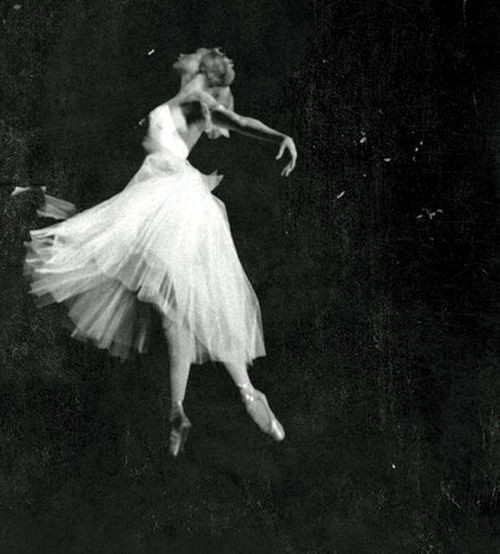
What is the law?
"An assumption, though false, if persisted in, will harden into fact."
(-Neville Goddard)
The law applies to ANYTHING. There is nothing that cannot be changed through assumption. You are limitless. Anything you imagine can be assumed, persisted in, and hardened into fact.
What you assume will materialize into reality.
What is an assumption?
(I cover this more after I explain 4D and 3D)
Assumption, noun
Something that you accept as true without question or proof.
(-Cambridge Dictionary)
Nothing outside of you can tell you what is and isn't true. Your word is fact. You are the proof, the validation, the evidence.
What you assume to be true IS true.
Do not under any circumstances accept something that you do not want in your reality as true.
What is 3D and 4D?
Third dimension
Physical reality, experienced with the physical senses. Sometimes called the "mirror"
Fourth dimension
Internal reality, experienced through thoughts, mental images, assumptions and the subconscious mind. Sometimes called "true reality"
What do they have to do with manifestation?
The physical reality is a reflection of the internal reality. You create the 4D and it is reflected back to you in the 3D. This is why people sometimes call the physical reality a "dead mirror" because it is a physical reflection of your internal perception of reality.
When people say the 4D is the true reality they mean nothing is true unless it's true in the 4D.
The 3D is not the ultimate truth, assumption is.
Many people get caught up in the 3D because they're unable to accept that the physical reality isn't THE truth.
The second you assume something you automatically have it in the 4D.
NOTHING is true until you accept it as true. YOU have the final say, always. The 3D does not dictate fact, YOU do.
How do we change the 4D?
Assumption, repetition, visualization, but heavy emphasis on assumption.
Assumption
Assume you have what you want already. Do not look for proof or justification, an assumption is belief without evidence.
Know that no matter what happens in the 3D, no matter what you see hear or feel, you have what you want.
Do not bend to the 3D. Your assumption is true.
You want to manifest healthy hair?
Your hair is already healthy. "But I'm looking at it it's no-" nope it's already healthy. You know it's healthy because you assumed it was.
You decide that it is true and it has worked, ignore anything outside of yourself that tells you otherwise, know that it is true because you fucking said it was.
That's it, you decide, know it to be true and ignore anything but that decision.
You decide you have your manifestation and ignore ANYTHING but that decision.
Repetition
Repeating/reminding yourself of your assumption. It can be hard for people to persist in assumptions because sometimes it's just easy to forget. So repetition comes in to remind you of your assumption and to hammer into your brain that it's true.
For example, you want to have healthy hair?
Repeat to yourself throughout the day that you have healthy hair.
Robotic affirmations are great for this.
Robotic affirmations are affirmations that are repeated again and again. They do not require feeling or belief while you say them. You can feel like shit and still affirm affirm affirm.
The best times to affirm are when you wake up, before you go to sleep, and in place of letting your mind roam free during boring tasks.
Visualization
This is helpful for those who struggle with desiring proof. Visualization helps ground people in their assumptions by not only reminding them it's real but giving them the feeling of having it
For example you want healthy hair?
Anytime you feel the urge to check your hair to see where it's at or you're thinking about your desire imagine it as healthy and remind yourself that what you've imagined is real.
Use your visualization as proof or validation that your assumption is true instead of checking the 3D.
How to persist
Literally just keep going. Realize the the 3D is not the authority on what is and isn't true and keep going.
You're allowed to feel like shit. You're allowed to be scared or angry or frustrated, but keep going.
It's not about how you feel it's about what you know and you KNOW it's true.
What is old story new story?
Old story
Old beliefs and internal perception of reality that you previously accepted as fact. AKA the negative story you've told yourself about your life.
New story
New assumptions you would like to persist in. AKA the positive story you are going to start telling.
The idea is that you have to let go of your old perception of reality and your life if you want to experience something different.
Stop telling yourself stories about who you are and what you're experiencing if you don't want to keep experiencing them.
#loa tumblr#loa blog#loass#loablr#loassumption#loassblog#loa#loass blog#loa ask#loa assumptions#loa advice#loa affirmations#loa community#loa manifestation#loa motivation#loa manifesting#loa methods#loa states#affirmyourreality#affirmdaily#affirmyourlife#affirm and persist#neville goddard#shiftblr#ask stardust
46 notes
·
View notes
Text
NLRB rules that any union busting triggers automatic union recognition
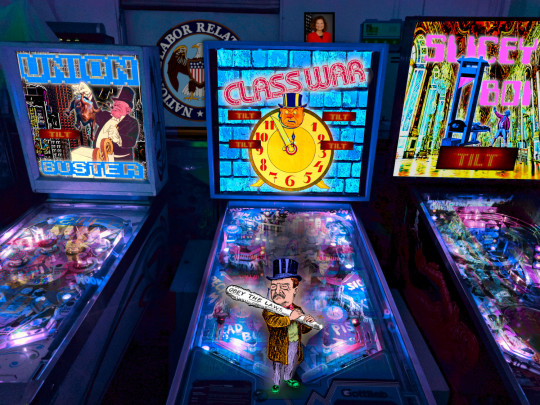
Tonight (September 6) at 7pm, I'll be hosting Naomi Klein at the LA Public Library for the launch of Doppelganger.
On September 12 at 7pm, I'll be at Toronto's Another Story Bookshop with my new book The Internet Con: How to Seize the Means of Computation.

American support for unions is at its highest level in generations, from 70% (general population) to 88% (Millenials) – and yet, American unionization rates are pathetic.
That's about to change.
The National Labor Relations Board just handed down a landmark ruling – the Cemex case – that "brought worker rights back from the dead."
https://prospect.org/labor/2023-08-28-bidens-nlrb-brings-workers-rights-back/
At issue in Cemex was what the NLRB should do about employers that violate labor law during union drives. For decades, even the most flagrantly illegal union-busting was met with a wrist-slap. For example, if a boss threatened or fired an employee for participating in a union drive, the NLRB would typically issue a small fine and order the employer to re-hire the worker and provide back-pay.
Everyone knows that "a fine is a price." The NLRB's toothless response to cheating presented an easily solved equation for corrupt, union-hating bosses: if the fine amounts to less than the total, lifetime costs of paying a fair wage and offering fair labor conditions, you should cheat – hell, it's practically a fiduciary duty:
https://www.jstor.org/stable/10.1086/468061
Enter the Cemex ruling: once a majority of workers have signed a union card, any Unfair Labor Practice by their employer triggers immediate, automatic recognition of the union. In other words, the NLRB has fitted a tilt sensor in the American labor pinball machine, and if the boss tries to cheat, they automatically lose.
Cemex is a complete 180, a radical transformation of the American labor regulator from a figleaf that legitimized union busting to an actual enforcer, upholding the law that Congress passed, rather than the law that America's oligarchs wish Congress had passed. It represents a turning point in the system of lawless impunity for American plutocracy.
In the words of Frank Wilhoit, it is is a repudiation of the conservative dogma: "There must be in-groups whom the law protects but does not bind, alongside out-groups whom the law binds but does not protect":
https://crookedtimber.org/2018/03/21/liberals-against-progressives/#comment-729288
It's also a stunning example of what regulatory competence looks like. The Biden administration is a decidedly mixed bag. On the one hand there are empty suits masquerading as technocrats, champions of the party's centrist wing (slogan: "Everything is fine and change is impossible"):
https://pluralistic.net/2023/01/10/the-courage-to-govern/#whos-in-charge
But the progressive, Sanders/Warren wing of the party installed some fantastically competent, hard-charging, principled fighters, who are chapter-and-verse on their regulatory authority and have the courage to use that authority:
https://pluralistic.net/2022/10/18/administrative-competence/#i-know-stuff
They embody the old joke about the photocopier technician who charges "$1 to kick the photocopier and $79 to know where to kick it." The best Biden appointees have their boots firmly laced, and they're kicking that mother:
https://pluralistic.net/2023/08/16/the-second-best-time-is-now/#the-point-of-a-system-is-what-it-does
One such expert kicker is NLRB General Counsel Jennifer Abruzzo. Abruzzo has taken a series of muscular, bold moves to protect American workers, turning the tide in the class war that the 1% has waged on workers since the Reagan administration. For example, Abruzzo is working to turn worker misclassification – the fiction that an employee is a small business contracting with their boss, a staple of the "gig economy" – into an Unfair Labor Practice:
https://pluralistic.net/2022/01/10/see-you-in-the-funny-papers/bidens-legacy
She's also waging war on robo-scab companies: app-based employment "platforms" like Instawork that are used to recruit workers to cross picket lines, under threat of being blocked from the app and blackballed by hundreds of local employers:
https://pluralistic.net/2023/07/30/computer-says-scab/#instawork
With Cemex, Abruzzo is restoring a century-old labor principle that has been gathering dust for generations: the idea that workers have the right to organize workplace gemocracies without fear of retaliation, harassment, or reprisals.
But as Harold Meyerson writes for The American Prospect, the Cemex ruling has its limits. Even if the NLRB forces and employer to recognize a union, they can't force the employer to bargain in good faith for a union contract. The National Labor Relations Act prohibits the Board from imposing a contract.
That's created a loophole that corrupt bosses have driven entire fleets of trucks through. Workers who attain union recognition face years-long struggles to win a contract, as their bosses walk away from negotiations or offer farcical "bargaining positions" in the expectation that they'll be rejected, prolonging the delay.
Democrats have been trying to fix this loophole since the LBJ years, but they've been repeatedly blocked in the senate. But Abruzzo is a consummate photocopier kicker, and she's taking aim. In Thrive Pet Healthcare, Abruzzo has argued that failing to bargain in good faith for a contract is itself an Unfair Labor Practice. That means the NLRB has the authority to act to correct it – they can't order a contract, but they can order the employer to give workers "wages, benefits, hours, and such that are comparable to those provided by comparable unionized companies in their field."
Mitch McConnell is a piece of shit, but he's no slouch at kicking photocopiers himself. For a whole year, McConnell has blocked senate confirmation hearings to fill a vacant seat on the NLRB. In the short term, this meant that the three Dems on the board were able to hand down these bold rulings without worrying about their GOP colleagues.
But McConnell was playing a long game. Board member Gwynne Wilcox's term is about to expire. If her seat remains vacant, the three remaining board members won't be able to form a quorum, and the NLRB won't be able to do anything.
As Meyerson writes, centrist Dems have refused to push McConnell on this, hoping for comity and not wanting to violate decorum. But Chuck Schumer has finally bestirred himself to fight this issue, and Alaska GOP senator Lisa Murkowski has already broken with her party to move Wilcox's confirmation to a floor vote.
The work of enforcers like DoJ Antitrust Division boss Jonathan Kanter, FTC chair Lina Khan, and SEC chair Gary Gensler is at the heart of Bidenomics: the muscular, fearless deployment of existing regulatory authority to make life better for everyday Americans.
But of course, "existing regulatory authority" isn't the last word. The judges filling stolen seats on the illegitimate Supreme Court had invented the "major questions doctrine" and have used it as a club to attack Biden's photocopier-kickers. There's real danger that Cemex – and other key actions – will get fast-tracked to SCOTUS so the dotards in robes can shatter our dreams for a better America.
Meyerson is cautiously optimistic here. At 40% (!), the Court's approval rating is at a low not seen since the New Deal showdowns. The Supremes don't have an army, they don't have cops, they just have legitimacy. If Americans refuse to acknowledge their decisions, all they can do it sit and stew:
https://pluralistic.net/2023/05/26/mint-the-coin-etc-etc/#blitz-em
The Court knows this. That's why they fume so publicly about attacks on their legitimacy. Without legitimacy, they're nothing. With the Supremes' support at 40% and union support at 70%, any judicial attack on Cemex could trigger term-limits, court-packing, and other doomsday scenarios that will haunt the relatively young judges for decades, as the seats they stole dwindle into irrelevance. Meyerson predicts that this will weigh on them, and may stay their hands.
Meyerson might be wrong, of course. No one ever lost money betting on the self-destructive hubris of Federalist Society judges. But even if he's wrong, his point is important. If the Supremes frustrate the democratic will of the American people, we have to smash the Supremes. Term limits, court-packing, whatever it takes:
https://pluralistic.net/2020/09/20/judicial-equilibria/#pack-the-court
And the more we talk about this – the more we make this consequence explicit – the more it will weigh on them, and the better the chance that they'll surprise us. That's already happening! The Supremes just crushed the Sackler opioid crime-family's dream of keeping their billions in blood-money:
https://pluralistic.net/2023/08/11/justice-delayed/#justice-redeemed
But if it doesn't stop them? If they crush this dream, too? Pack the court. Impose term limits. Make it the issue. Don't apologize, don't shrug it off, don't succumb to learned helplessness. Make it our demand. Make it a litmus test: "If elected, will you vote to pack the court and clear the way for democratic legitimacy?"
Meanwhile, Cemex is already bearing fruit. After an NYC Trader Joe's violated the law to keep Trader Joe's United from organizing a store, the workers there have petitioned to have their union automatically recognized under the Cemex rule:
https://truthout.org/articles/trader-joes-union-files-to-force-company-to-recognize-union-under-new-nlrb-rule/
With the NLRB clearing the regulatory obstacles to union recognition, America's largest unions are awakening from their own long slumbers. For decades, unions have spent a desultory 3% of their budgets on organizing workers into new locals. But a leadership upset in the AFL-CIO has unions ready to catch a wave with the young workers and their 88% approval rating, with a massive planned organizing drive:
https://prospect.org/labor/labors-john-l-lewis-moment/
Meyerson calls on other large unions to follow suit, and the unions seem ready to do so, with new leaders and new militancy at the Teamsters and UAW, and with SEIU members at unionized Starbucks waiting for their first contracts.
Turning union-supporting workers into unionized workers is key to fighting Supreme Court sabotage. Organized labor will give fighters like Abruzzo the political cover she needs to Get Shit Done. A better America is possible. It's within our grasp. Though there is a long way to go, we are winning crucial victories all the time.
The centrist message that everything is fine and change is impossible is designed to demoralize you, to win the fight in your mind so they don't have to win it in the streets and in the jobsite. We don't have to give them that victory. It's ours for the taking.

If you'd like an essay-formatted version of this post to read or share, here's a link to it on pluralistic.net, my surveillance-free, ad-free, tracker-free blog:
https://pluralistic.net/2023/09/06/goons-ginks-and-company-finks


#nlrb#cemex#unions#labor#class war#photocopier kickers#ulp#unfair labor practices#jennifer abruzzo#thrive pet care#national labor review board#scotus#afl-cio#trader joes#harold meyerson#labor day#pluralistic
3K notes
·
View notes
Text


▶ CATORU — stealing Suguru's clothes just feels natural, they're comfy and cozy and they smell like him, but thing is — his hoodies are black... and Satoru's hair is white.
contents: fluff; college!au, roommates, polyamorous relationship — 1k words
𝙇𝙊𝙑𝙀 𝙈𝙀𝘿𝙇𝙀𝙔 | series masterlist

“Geez, you really need to brush that cat out,” your best friend commented, plucking a white hair off your black hoodie once you dropped down onto the couch next to her placing the wine glasses, totally not regular glasses, and a bottle on the table. You invited her for the first time after you moved into the new apartment. It was a celebration of your new place, successfully passed exams and just a nice opportunity to catch up on life.
“Cat?” You looked at her; confusion apparent in your eyes and she pointed at the hairs in her fingers, few short, snow-white strands that she collected from you and surroundings. It wasn’t unusual – you had a habit of stealing Suguru’s clothes (and they are usually black), and Gojo has a habit of nuzzling into you, demanding head scratches so it’s only natural that his white hairs stick to you and are quite visible. “Ah, that cat. Yeah, I really need to brush him out. Or maybe I’ll just shave him, I don’t know yet.”
The thought made you giddy inside, it really cracked you up. Before that, you never realized that your friend had no idea what kind of relationship you are in. You never hid it from her, you openly told her about the three of you doing things together, but somehow, the possibility of you sharing your life with Suguru and Satoru at the same time flew over her head. You also are quite openly affectionate with both of your boys, but it’s possible that once your friend saw you kissing Geto, she automatically categorized your interactions with Gojo as purely friendly. You were not even sure if she ever had a chance to see you with your white-haired princess.
“It’s cute you and Geto took a white kitten. It’s because of Gojo, right?” She smiled cutely, throwing the hairs away as you poured her some of the cheap prosecco.
“Yeah, the kitten is definitely reminding us of Satoru.” You laughed softly, taking your own glass to your lips. “Our little Catoru.”
“Awww, that’s adorable,” she squealed, savoring the taste of pinkish liquid. “How is he dealing with it, by the way?”
“Dealing with what?”
“You know, how’s Gojo dealing with the fact you stole his best friend? I was wondering, is he okay with you being and living with Suguru? They are pretty much joined at the hip.” She was curious, genuinely, and you can tell she really has no clue, so you decided to play along.
“I mean, Satoru is doing great, you don’t need to worry.”
“’ts good,” your bestie exhaled with some kind of relief, and you couldn’t shake off the amusement off your shoulders. You wondered how she would react to the revelation of your polyamorous relationship. Would she be surprised? In your eyes, it was only natural to accept both Satoru and Suguru into your life, the boys are inseparable, you couldn’t date one without dating the other. That was just the way it is, the packaged deal, the law of nature if you will. “Is your boyfriend home?”
“Sugu? He has martial arts training today. Will be back later. Don’t worry about it, okay? You’re my guest,” you reassured her and the conversation went smoothly from that point. You talked a little about everything, about college, about teachers and recent exams, about love life and your recent dates.
“Is Gojo always third-wheeling you two?” She asked when you were telling her about your last movie night. The one that got all three of you deadly backpain afterwards because you all fell asleep on the couch in a position that even got Suguru and his super trained, stretched and fit body suffering. It’s better not to recall how you and Satoru felt.
“Sometimes I feel like I am third-wheeling them,” you laughed, “but yea, we’re actually–“
“Can I see the cat?” Your friend cut you off, suddenly all excited. “God, I completely forgot about him, can I see that fluffball?”
“Oh, I’m pretty sure the cat is sleeping and you know, that fluffball gets grumpy when woken up.”
“Pleeeaaaase, I promise, I won’t wake it up. I just want to see the little Catoru, he must be adorable.”
With an exhale you decided to give in. You knew Satoru had a rough night, he got back home in the morning after a visit at his parents’ house and you know his family can be pretty distressing. Now he’s probably sleeping it off, but just a quick visit shouldn’t hurt. With that thought you took your friend to your bedroom.
“Just please, don’t scream, okay? He’s dead tired.” You half-whispered, before opening the doors. She nodded and you peeked inside, just to make sure the cat wasn’t sprawled naked on the bed or something and once sure that it’s safe, you walked in, carefully placing your steps to make as little noise as possible.
Satoru was sleeping, tightly cocooned in blankets with only his head visible from the nose up. He was really worn out, you could tell by the way he was breathing, so deeply and heavily what only happened when he was exhausted. You crouched next to the bed, gently running your fingers through his hair and he purred something, automatically leaning into your touch. Satoru could be at his death bed and would still search for your warmth.
“Do you need something?” You asked quietly, brushing little circles onto his scalp. He made some kind of noise that sounded a little like a no, and you pressed a soft kiss to his forehead. “If you do, just call me, baby, I’ll be next door.”
Satoru purposefully uncovered the lower half of his face so you could give him a peck, and once he got that, he turned back to his cocoon. You whispered him a little love you, got up and left, leading your visibly stoked friend back to the living room. She was shocked, but at the same time it looked like a realization was hitting her hard and you saw in real time how her expression was changing.
“That was the cat?” She whisper-screamed.
“Yup.”
“So you and Geto and Gojo—?"
“Yup.”
“Like, all three of you?”
“Yes,” you chuckled, pouring her more wine. “I actually had no idea that you don’t know. I thought we’re quite obvious.”
“Now as I think about it, you kinda were… I’m gonna need more wine.”
“I’ll text Suguru.”

taglist: @gojos-thot-patrol-main , @chuluoyi
#𝙇𝙊𝙑𝙀 𝙈𝙀𝘿𝙇𝙀𝙔#satosugu#satoru#satoru gojo#suguru#suguru geto#geto suguru#gojo satoru#satosugu x you#satosugu x reader#satosugu x y/n#satosugu fluff#satoru gojo fluff#suguru geto fluff#geto fluff#gojo fluff#jjk satosugu#jujutsu kaisen fluff#jujutsu kaisen x reader#jujutsu kaisen x you#jujutsu kaisen x y/n#jjk x reader#jjk x you#jjk x y/n#gojo x reader#gojo x you#gojo x y/n#satoru gojo x you#satoru gojo x reader#satoru gojo x y/n
2K notes
·
View notes
Note
How would you describe Tim's people skills? Especially when you compare them to Dick's?
Hi anon, this was a fun ask!! I picked out a few panels for each of them (comforting friends, a bit out of sync with friends, fighting with friends, and offering practical support to friends) just to get a quick look at their people skills in action, and then I rambled on about my thoughts on their strengths and their weaknesses.
(Caveat: I'm going to try to focus on my ideas about differences between the two of them, since we're comparing, but I do think they're socially more similar than not, so you might also want to check out @bitimdrake's post on Dick and Tim's similarities for the big picture!)
Short version: I think they've both got good people skills. Dick's are a bit better and more natural, whereas Tim's are more practiced and learned (in ways that sometimes show).
Let's start with Dick first, and then I'll get back to Tim.
Dick
Comforting friends in Titans Secret Files:
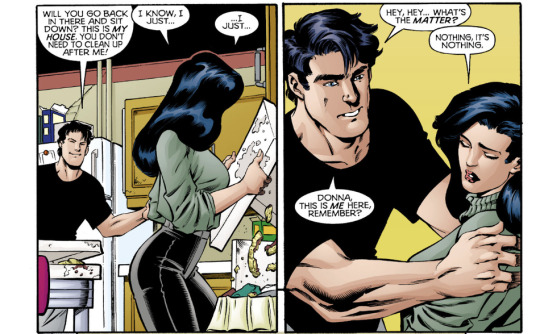
Dick: Will you go back in there and sit down? This is my house. You don't need to clean up after me!
Donna: I know, I just... I just ...
Dick: Hey, hey... what's the matter?
Donna: Nothing. It's nothing.
Dick (reaching out to supportively grip her shoulders): Donna, this is me here, remember?
A bit out of sync with friends (but still getting along well) in Titans 3:
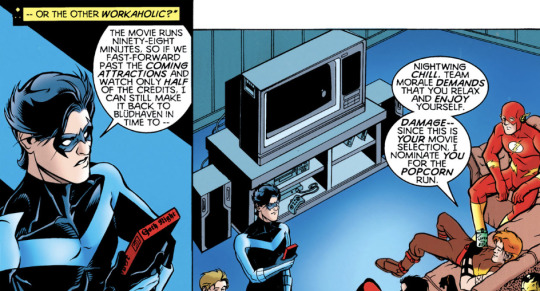
Dick: The movie runs 98 minutes. So if we fast-forward past the coming attractions and watch only half the credits, I can still make it back to Blüdhaven in time to -
Roy: Nightwing, chill. Team morale demands that you relax and enjoy yourself.
Fighting with friends in Titans 13:
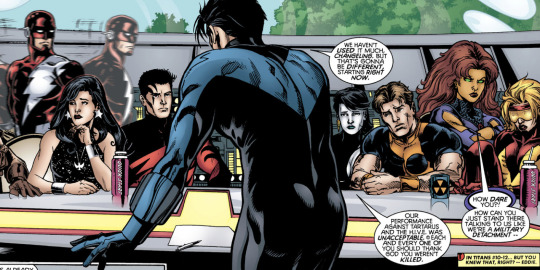
Dick: We haven't used it much, Changeling. But that's gonna be different. Starting right now. Our performance against Tartarus and the HIVE was unacceptable. Each and every one of you should thank God you weren't killed.
Kory: How dare you? How can you just stand there talking to us like we're a military detachment -
Giving support to relative strangers in Nightwing 87:

Neighbor 1: Oh, he - he's a true gentleman, you know? Always holds the door, or helps me up the stairs with my groceries if we both come in at the same time...
Neighbor 2: ...used his motorcycle to jumpstart my car one morning and even got my brother-in-law a job with Wayne Enterprises when he got laid off...
Neighbor 3: ...and he's very, very, very nice and doesn't talk down to me. Plus he lets me use his basketball.
Offering practical support (making dinner) in Prodigal:
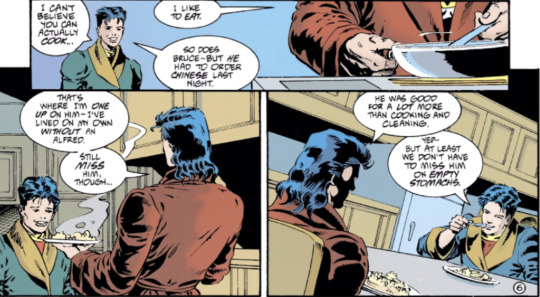
Tim: I can't believe you can actually cook...
Dick: I like to eat.
Tim: So does Bruce - but he had to order Chinese last night.
Dick: That's where I'm one up on him - I've lived on my own without an Alfred. Still miss him, though... He was good for a lot more than cooking and cleaning.
Tim: Yeah. But at least we don't have to miss him on empty stomachs.
Strengths:
I think Dick's people skills are pretty simple: he has them! He's good at people! And I tend to think of Dick's people skills as so automatic they're mostly instinctive. It's not something he really has to think about because it's so ingrained in him. A combination of natural talent plus a childhood spent around sociable performers means Dick's just really highly attuned to the people around him.
And I don't think he's particularly obvious about it. So e.g. you could be having a conversation with Dick where he didn't seem like he was paying close attention, but if there was An Important Moment where you got anxious for a moment or let something important slip or let a bit of anger show through etc. - Dick will have picked up on it, even if it's unconsciously, and it'll stick with him and come back to him later.
And just generally - I think Dick has good instincts for who he can trust and who he shouldn't trust; when he's treading on conversational landmines he'll often pick up the unease even if he doesn't have the context to know why there's a problem; if he's trying to comfort and trusts his instincts he'll often do the right thing even if he can't justify in words why he felt like that was the right thing to do.
So I think for Dick, there's always the level of conscious awareness - the things he's aware he knows, if you will - and the level of unconscious awareness - things he senses, but maybe can't explain, or maybe doesn't want to know so he's suppressing the thoughts.
So he's good at leading, and he's good at comforting, and he's good at listening, and he's good at figuring out the right thing to say...
Like, he's good at all of it, so it's actually sort of difficult to elaborate because there's just not that much nuance? Given any particular interpersonal situation, Dick has an excellent chance of getting a quick read on some random guy he's just met and then getting the reaction he wants pretty fast, whether it's intimidating the guy or comforting him or getting him to cooperate or taunting him until he loses his temper, etc etc etc.
Obviously Dick's not a mind reader, and he can get things wrong, especially when he's in the throes of one of his own personal crises, but generally I think Dick's very very sure-footed with people, even with strangers.
Weaknesses:
This isn't a weakness precisely because Dick's usually doing it on purpose, but he'll sometimes have fights with his friends because they think he's acting overly professional/detached and he thinks they're not being professional enough. So e.g. in Titans 13, you can see Dick's set up the room almost like he's leading a business meeting, and he's the boss lecturing them, and they're reacting by getting mad at him. Part of this is basically a Traditional Bat Problem - Tim's friends also balk because they feel like Tim's keeping them at a distance - but Dick tends to lean especially hard on "I'm The Leader Here So Shut Up And Do What I Say" professionalism / distancing.
When things are going well, Dick's friends may grumble at his intense professionalism but basically appreciate it (this is basically how things go in their reunion in TT vol 2); when things are not going well, though, it becomes a point of tension. Generally, Dick gets extra-professional as a coping mechanism when under stress, as here in TT vol 2 12:
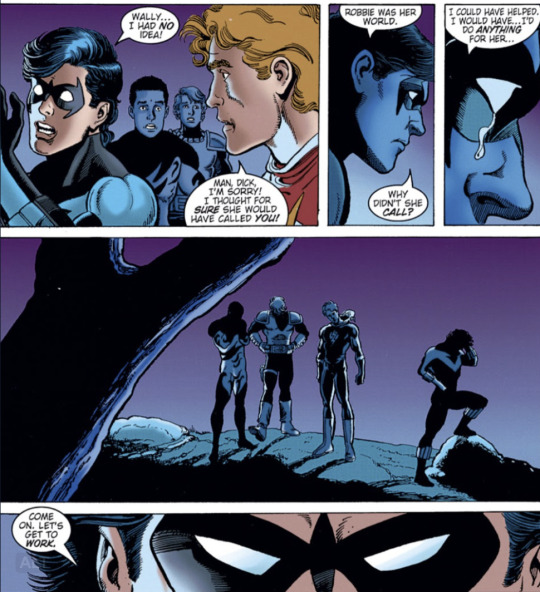
To the extent that Dick falters with social skills, it tends to be almost exclusively with people he knows well, not with strangers. Dick sometimes struggles with maintaining relationships, largely because he's often juggling multiple responsibilities; he'll sometimes get hyperfixated on something and deprioritize his more stable relationships (so e.g. when he gets fixated on trying to fix Blüdhaven and gets distracted from his relationship with Babs).
Somewhat relatedly, if things start going wrong in his own life, he tends to self-isolate out of shame and avoid everyone he thinks of as more put-together. So, for example, in the aftermath of Blockbuster, he's a self-destructive mess who's trying to dodge and/or drive away Clark and Roy and Tim (all people who care about him and would want to help), but Sophia Tevis and Rose are two messed-up young strangers in trouble and their obvious neediness trips his "urgency" meter, plus he may be a mess but they have no context to realize that so he doesn't feel so self-conscious, and he's able to be drive-by super-helpful to them and then dive right back into privately self-destructing.
Also not a weakness per se, but he tends to be a bit of an introvert in general - he and Wally are close, but they go long stretches of time without catching up; when he's spending time with friends, usually it's Donna / Wally / the Titans / Tim visiting Dick rather than the other way around; he's more likely to get cajoled into joining a team than the other way round - Wally talks him into rejoining the Titans and Roy talks him into joining the Outsiders. He likes people and likes spending time with friends, but he's usually not the one initiating a social gathering. He's self-aware about this; in Titans 9, he muses, "It's not the newness that's the problem. The problem is the old stuff. The ruts. You know someone long enough - well enough - and you fall into a rut with them... you completely take the relationship for granted..."
Relatedly, because Dick's pretty self-contained, he has a recurring problem where loved ones interpret him as distant or detached or indifferent even when he's still passionately attached - both Kory and Babs break up with Dick in part because they feel like he's not really that committed to them (also there are mmm Problematic Plotlines involved but I'm ignoring those for the purposes of this post), and in both cases IMO they're misreading him. He's deeply upset by both breakups and responds with big declarations of feeling and, uh, proposing marriage shortly afterward. (Okay, so he's not ALWAYS sure-footed sdfdsfs)
When Dick's getting something wrong, it's usually because he's upset and overcompensating - when things with Kory and Babs are tense, he tries to fix it with Big Gestures; when Vic's mad at him about spying, he missteps with an elaborate secret plan culminating in a big dramatic offering of a new body which Vic does want... but he's still understandably miffed at Dick for making a bunch of decisions behind his back instead of talking to him. Dick guesses right about something Vic will want, but because Dick when he's feeling guilty tends to slide into I-Am-The-Leader, I-Must-Fix-Everything-By-Myself, I-Am-Responsible-For-Everything mode, he forgets that the whole original problem is connected to not respecting Vic's autonomy / right to make decisions for himself, and that a better gesture would be asking Vic what he wants instead of once again making decisions on his behalf without consulting him. (I'm sympathetic to Dick's spying-on-Vic plan on account of how Vic did turn into an evil moon for a bit - comics are bonkers, you guys sdfdsfs - but I'm also very sympathetic to Vic feeling that he deserved fuller disclosure here.)
And you can see similar patterns in lower-key conflicts too: every time Dick gets accused of being just like Batman, it's usually because he's coming off as harsh or detached or uncaring (sometimes on purpose because he's pushing people away; sometimes just because Dick handles grief and fear by shutting down; sometimes because his the-buck-stops-here leadership style can come off as overly-detached), even though Dick actually cares SO SO MUCH, all the time, about everyone he knows.
But honestly... these weaknesses exist, but they're minor in comparison to his strengths?? Dick's a guy with a lot of very strong friendships for a reason. He's true as steel and once he cares about you, he cares about you forever. <3
OKAY! So that's Dick. Let's finally move on to...
Tim
Comforting friends in Joker's Last Laugh 3:
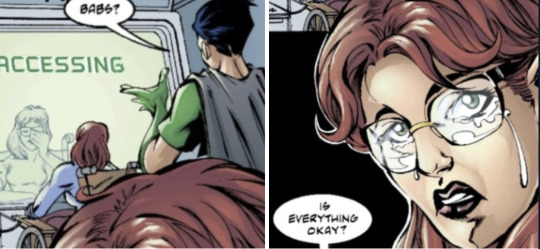
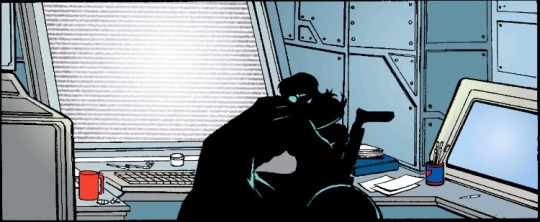
Tim: Babs? Is everything okay? (hugs her)
A bit out-of-sync with friends (but still getting along well) in Young Justice 7:
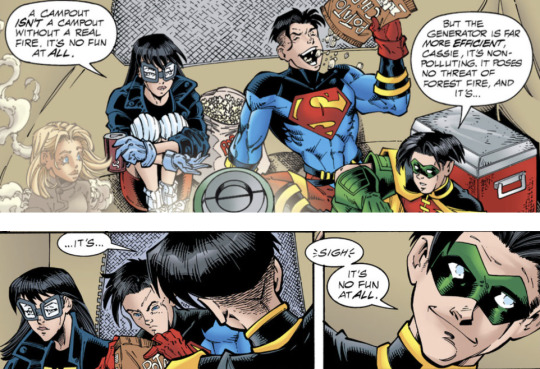
Cassie: A campout isn't a campout without a real fire. It's no fun at all.
Tim: But the generator is far more efficient, Cassie. It's non-polluting, it poses no threat of forest fire, and it's... it's ... (taking in everybody else's expressions, sighing, reversing course) It's no fun at all. Impulse, can you...?
Fighting with friends in Adventure Comics 3 (stonewalling, avoidance, and lying!)
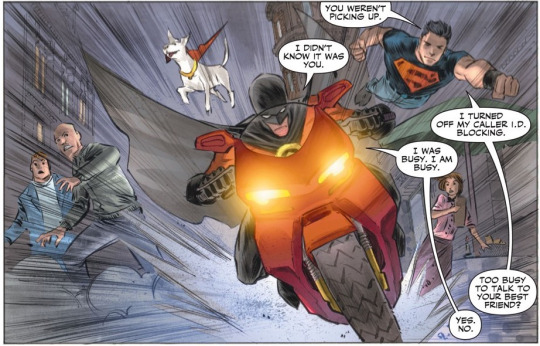
Conner: You weren't picking up.
Tim: I didn't know it was you.
Conner: I turned off my caller ID blocking.
Tim: I was busy. I am busy.
Conner: Too busy to talk to your best friend?
Tim: Yes. No.
Giving emotional support to relative strangers in Robin 98 / 100 / 156:
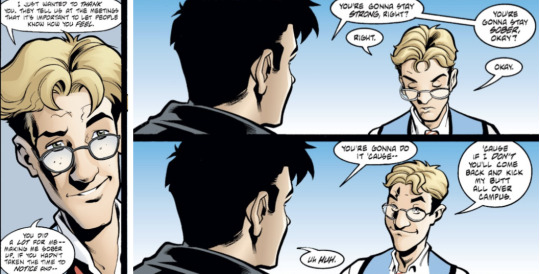
Wesley: I just wanted to thank you. They tell us at the meetings that it's important to let people know how you feel. You did a lot for me - making me sober up. If you hadn't taken the time to notice - (Later)
Tim: You're gonna stay strong, right? (Wesley: Right.)
Tim: You're gonna stay sober, okay? (Wesley: Okay.)
Tim: You're gonna do it 'cause -
Wesley: 'Cause if I don't you'll come back and kick my butt all over campus. Tim: Uh huh.
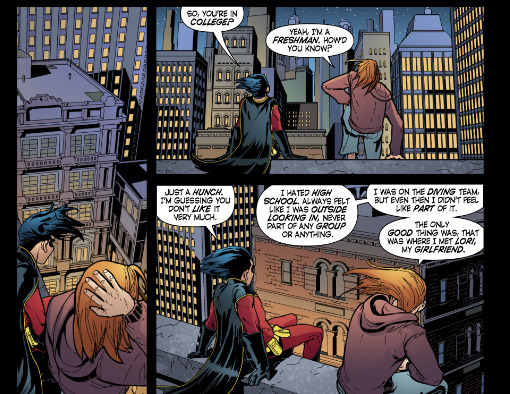
(The redhaired guy was about to jump. Tim convinces him to sit down and talk first.)
Tim: So, you're in college?
Guy: Yeah, I'm a freshman. How'd you know?
Tim: Just a hunch. I'm guessing you don't like it much.
Guy: I always hated high school. Always felt like I was outside looking in, never part of any group or anything. I was on the diving team but even then I didn't feel like part of it. The only good thing was that was where I met Lori, my girlfriend.
Offering practical support (medical care and tea) in Batgirl 59:
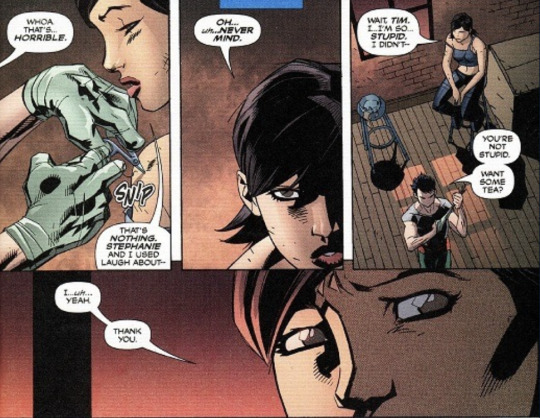
Tim (treating her injury as she shares her traumatic past): Whoa. That's ... horrible.
Cass: That's nothing. Stephanie and I used to laugh about - oh... uh... never mind. Wait, Tim. I... I'm so ... stupid, I don't -
Tim: You're not stupid. Want some tea?
Cass: I ... uh... yeah. Thank you.
Strengths:
Tim! I think Tim's also pretty decent at people - not as good as Dick, but hardly anyone is?
I tend to think of Dick as instinctively good at people, and Tim as more consciously good at people.
Tim spends a lot of time being intentionally watchful: observing, spying, psychoanalyzing people, paying careful attention to what they say, thinking about what makes them tick. (And Tim psychoanalyzes himself, too. Tim is studiously engaged in the study of Tim, and of Tim's friends, and of Tim's family. He's often playing a role, even when that role is "Tim Drake.")
So e.g. in Red Robin, at one point Tim has an elaborate domino-falling database where he's compiled a list of villains he wants to fight and how he wants to fight them, all leading up to a very careful takedown plan for Boomerang where he's thought through and anticipated Boomerang's every move ahead of time... and he's basically right! He gets it all right!
And this kind of intensely-studied logical chess-game of "he will do this for this reason, and then this for that reason, and the other people will respond in this way, like a series of dominos, and I've thought through all the possibilities" is Very Tim to me, and I feel like... this is just the sort of thing that Dick would never ever do?
And mostly Dick wouldn't do it because he wouldn't have to. When Dick's skeptical of James Gordon Jr., he goes to talk to the guy and feel him out, and he ethically feels obliged to give him the benefit of the doubt because there's no evidence against him, but he's got a bad feeling and doesn't trust him and secretly slaps a tracer on him because he's got an instinct he'll want it, and he's right: James Jr. is up to something, and that tracer is exactly the thing that Dick needs.
And similarly if Dick wanted to goad James Jr. into doing something, I think he'd go off and meet him and goad him into doing it, and he'd have an instinct for what to say to make that happen - I think the whole elaborate domino plan that Tim comes up with for Boomerang would feel unnecessarily complex to Dick. Not that Dick doesn't make complicated plans, because he absolutely does, but Dick doesn't usually overthink people.
Similarly, if Dick had been the little kid in Lonely Place of Dying, he'd have gotten worried and gone straight to Bruce and talked to him, not gotten worried and taken photos of Bruce from a distance and then come up with an elaborately overthought plan to go to New York and track down his estranged son and fix him that way. And, like. Kid!Tim's not entirely wrong! He's correctly picked up on a very real and very strong connection between Bruce and Dick even though he doesn't know either of them! And given how little actual information Tim has, this is actually an impressive plan (it's a bad plan, because Tim doesn't know about their fights, but it's an impressively solid plan given that his entire information basis is "watched them from a distance and collected news reports"). But this isn't how Dick thinks about people.
Backing up to a more general point: Tim values people skills really really really highly. I think "uses interpersonal skills to help and comfort other people" is one of Tim's highest values and arguably the highest value - he imprinted on Dick because he was kind, and then imprinted on Batman because he was comforting Dick. And he has six million After-School-Special-style plotlines where he tries to comfort / advise / rescue / etc. people in various stages of emotional distress and who are using bad coping mechanisms. His very first outing as Robin involves talking down a semi-suicidal shooter; the big finale of YJ has Tim talking Secret down from her rampage; he's very gentle when he's comforting his girlfriend after she confides in him about a maybe-attempted-rape; he talks down a suicidal college student in Robin; plus there's the entire concept of "Batman needs Robin" in the first place; not to mention his obsession with the importance of friends; and so forth.
So it's something that he's good at because it's something he values and works at. His people skills are conscious and learned. He does a fair bit of amateur psychoanalysis of other people's problems, and he's generally good at identifying the problems, even if he's not always great at fixing them. And he's often playing a role, or imitating other people, rather than being himself; he invests a lot of time constructing alternate identities; he's often more comfortable wearing a mask. (It is just so typical of Tim that his civilian friendship group is the DCU version of D&D players.)
So his practiced-people-skills work decently well, because he's diligent and he cares a lot, and he's better at people when he's older than when he's younger. And he's extremely good at things he's had a lot of practice with, like meeting new schoolmates, or making small talk, and he's friendly and he likes people, and he's good at learning scripts and following them, and he only tends to misstep when he's distracted or unusually anxious or when he's in a situation where normal social norms don't help. (Of course, since he's a vigilante and not an ordinary person, distracted / unusually anxious / weird situation are all things that happen more often than you might think!)
I also think Tim has a few caretaker instincts that have become automatic - generally he's hyperaware of when people are upset and usually tries to reach out or fix it, and even when he's trying to keep himself at a distance he'll slide into caretaking sometimes - so e.g. there's that moment in Batgirl with Cass when Tim's kinda upset with her for siding with Batman (and distancing himself from other people in general), so he's not intending to get close to her, but also what we see him doing is treating her wounds and then getting her tea. And meanwhile Cass actually wants to reach out, and she's intensely observing him and worrying and wanting to help, but what she actually does is... drink the tea. That Tim got her. While she stays firmly on her side of the couch.
(I tend to think of Cass as slightly similar to Tim but at the very very very beginning of her learn-to-people journey here? Like Tim, she cares!! A lot!! And she's successfully understood that Tim's upset, and she knows when she's put her foot in her mouth. But she's not sure what to do yet.)
Weaknesses:
Tactless! This is a tricky word because I think people sometimes hear 'tactless' and misunderstand it as 'generically rude,' but that's not quite the issue - Tim's quite polite most of the time; his problem is that his default mental monologue is very detached / psychoanalyzing / analytical, including about himself and things he's emotional about. He'll often be analyzing his own emotions even in the process of having them (I also talk about this a little here, though it's mostly a post about Dick and anger), and Tim's also constantly analyzing other people.
This means that if he doesn't edit his brain-to-mouth filter, he can come off as too detached or professional or calculating.
This is obviously similar to Dick's problem of coming off as too detached / professional - again, they're both Bats - but it's not quite the same thing, and I think this distinction is most obvious if you look at the places where they're doing it on purpose and picking fights:
Dick's most likely to pick fights by pulling rank: "I'm the boss, you all fucked up this mission and you better not do it again, shape up or shut up." This is a kind of distancing that's about Dick-the-impassive-boss and you-the-subordinate.
By contrast, Tim's more likely to pick fights via hostile psychoanalysis: "I notice you're being snide about Cass again, but we both know you're actually just mad that Bruce cares about her more than he cares about you." When he's miffed, both his inner monologue and the things he says tend toward 'uncharitable analysis of your emotional weaknesses,' and this is something he periodically directs at Bruce / Jason / Damian. This is a kind of distancing that's about Tim-the-hostile-analyst and you-the-unfortunate-target-of-analysis.
(Caveats: I don't think Tim's above trying to pull rank if he can, but he rarely has the opportunity; Dick's not above jabs at other people's weaknesses when he's very defensive and feeling attacked - junkie, elevator - but IMO he's more likely to pull rank, whereas Tim's jabs are more likely to be wrapped up in insulting psychoanalysis, so e.g. Jason's insecurity is his problem. The Jan Brady of the Batfamily.)
You can see related similar-sounding-but-different issues if you look at some of their respective breakups. So e.g. Dick has a breakup with Babs in which she thinks he doesn't care about her, and Tim has a breakup with Cassie in which she thinks he doesn't care about her. And these breakups are different for six million reasons (among other things, Dick and Babs have a pretty intense romance, whereas, uh, Tim and Cassie have had one date and IMO she's very right that they're better off as friends).
But you also get some useful character notes:
Babs is wrongly anxious that Dick's mostly in love with nostalgia for their past rather than the person she is now (he 100% does love the person she is now!) and she's being unfairly bitchy about Catalina, but she's also correctly noted that he's gotten into the habit of deprioritizing their relationship in favor of vigilante busywork & that he's been a bit pushy in swooping in protectively rather than letting her fight her own battles, so when she's accusing him of being a control freak it's not completely coming from thin air; Dick responds by getting hurt, upset, and direct (he gets furious and punches something, but then makes a big sweet sincere emotional speech to her about how much he cares and values her, albeit one that's so caught up in his own emotions like wanting to "protect" her that he's not slowing down enough to take in her insecurities).
Cassie has correctly realized that dating Tim is a bad coping mechanism and she really needs to just deal with her grief over Conner; when she starts crying, at first Tim moves to comfort her, but when she actually clarifies the breakup, an upset Tim responds by aggressively de-emotionalizing the conversation and pretending he's being totally logical and not emotional about it - he first wonders aloud if he's a bad detective for not seeing it coming and then attempts a bonkers guilt-trip suggestion that it's their duty to date in order to uhhh avoid turning evil in the bad future (sdfsfdsfdsfds sure tim nice try)
This isn't because Tim literally doesn't have feelings, because of course he does! But often, the more upset he is, the worse he gets at clearly expressing those feelings, and the more he intellectualizes them or avoids discussing them.
(Caveat: The trouble with any distinction is that it's easy to exaggerate it in ways that are oversimplified, and I want to emphasize that this doesn't reduce to "Dick always expresses emotions, Tim is never emotional," or anything like that. Dick has a bunch of complicated feelings about the intensity of his emotions because he values control and detachment and often is trying to be more detached (I talk more about this in the context of anger here and here); Tim often retreats to faux-analytical detachment when he's actually very emotional; and these are tendencies rather than one-note 24/7 truths - Dick is completely capable of intellectualizing away his emotions; Tim is completely capable of just getting straightforwardly and directly upset. But if you're looking for broad distinctions, I think it's fair to say that Dick's usually better at directly using his words and expressing his emotions, even if he sometimes feels self-conscious shame about it later, whereas Tim tends to self-sabotage and deflect and hide by producing intellectualized faux-logic instead of just being direct about what he wants or what he's feeling.)
An unrelated issue is that Tim also tends to get intrusive when he's anxious, and it gets worse the more he cares about you. Tim really really really wants to know what's going on and has an intense Need To Help, which generally works out for him - this is the entire reason he pushes his way into the Batfamily! - but it's easy to imagine Tim running into people who might not appreciate his busybody sneakiness; so e.g. secretly stalking your friend because he has a bruise, or running your friend's DNA, etc., is... stuff that all comes from how much Tim cares, but also it involves a very fuzzy relationship with other people's privacy, so Tim's friendships that stick around tend to be with people who find this kind of intense observation to be caring rather than pushy. Relatedly, Tim's version of "be protective" can overlap with "be condescending," which means he tends to get along best with confident people like Bruce, who could punt him into a wall and who thus finds Tim's 'disapproving medic' shtick endearing instead of insulting.
Tim also struggles to connect to people for whom he doesn't have an obvious "script" or who don't respond to his usual scripts. So e.g. offering Gar a "you don't like me but let's be friends" handshake worked; offering Cass a "let's be friends" handshake worked; offering the same thing to Damian did not go over so well; and I think this kind of "it usually works so this is my habit now?" thing is very Tim, and I don't think it's the sort of mistake that Dick would make.
More broadly, because Tim's people skills are conscious and learned - the effort sometimes shows! He stares at people. He secretly spies on them. He pokes around in their secrets. Dick can be paying close attention to you and seem like he's not, so that his awareness seems effortless and less intrusive. I think Tim's awareness tends to be a bit more effortful.
That said, though, I don't think that Tim's intensely-observing-you shtick is necessarily obvious except to people who are fairly socially-skilled themselves. When I write fanfic, I generally write from Dick's POV, and I tend to write Dick being hyperaware of when, say, Tim's observing him, or trying to figure out what's going on with him. But I think of that as more "Dick's good at reading Tim and really aware of being watched, so every attempt at subtlety stands out in neon lighting," and I think to someone who's less good at reading people than Dick is, Tim is a lot subtler.
And I think for e.g. someone like Cass, who really struggles with people skills, Tim seems impossibly and naturally good at interactions in the same way that to Tim, Dick seems incredibly good at it.
#ask tag#dick grayson#tim drake#hi anon this is SO OLD i'm so sorry sdfdsfds#i am very slow & this is very long because i kept adding things to it but this was a very fun ask thank you <3
294 notes
·
View notes
Text
CHAD ANON-
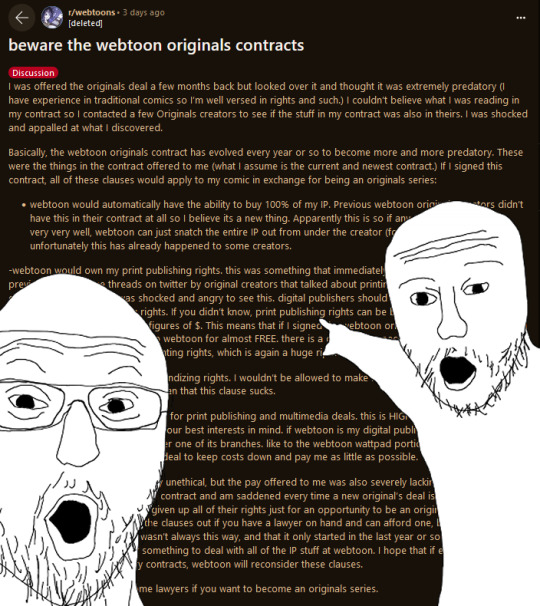
Alright so I've been meaning to post about this for a couple days, but we gotta talk about what's been going on in the /r/webtoons subreddit the last couple days.
Every now and then, the heavens part and an anonymous creator will descend with their experiences with Webtoons. And they're almost never good. And that's good in the long run, because that means we have more ammunition to support Webtoons being an ass platform that benefits no one :))
Obviously the anons here are risking a lot posting this sort of stuff, so before I go ahead, let it be known that I'm gonna try and keep speculating to a minimum and just touch on what anon has provided. When it comes down to it, this post hasn't been verified in any way, so it might not even be 100% real, though there's a lot of evidence to suggest it is based on the responses from other users that validate many of the points anon makes.
I will also mention that any opinion I have regarding the contract outside of what's been provided by anon is from reading other accounts from creators who have spoken up and just generally being a community member for a long time who's been around the bend and heard a lot of shit from Originals creators. I am not an Originals creator and I have never been offered any of these contracts.
So let's get into this!
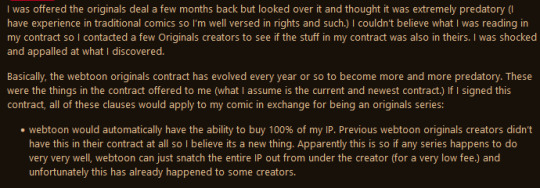
The contract 'evolving' over time was definitely something that a lot of us were at least semi-aware of, as it seems that a lot has changed since 2020 as verified by many creators who have spoken up on their contracts (or at least said what they could in light of the NDA's that WT uses to prevent them from saying anything). But I had no idea the extent to how far WT was going with it, how much they were trying to get away with. Automatically having the ability to buy 100% of the creator's IP? That is a huge, massive no-no. I've had some creators heavily imply to me in the past that they've sold off portions of their IP, but WT being given the automatic pass to buy 100% is severely unethical.
For anyone out of the loop, IP means Intellectual Property. It means whatever content is being made, it belongs to the person making it. Lore Olympus is Rachel Smythe's IP. City of Blank is 66's IP. Of course, copyright law gets dicier when it comes to stuff like fair use, trademarking, etc. but for the sake of this topic, IP just means "if you made it, you own it". Webtoons typically buys digital print rights, meaning if you sign on as an Originals, that means you can only post that comic that you sold to the Originals section. It doesn't mean you can't use other platforms for other comics, just that for the comic you sold, you have to post exclusively to Webtoons.
Webtoons is essentially trying to take that from creators by going "if you sign on as an Originals creator, you don't just lose your distribution rights, you lose all of your rights." They might still be able to run Canvas comics separate from Originals, but whatever they sold to Originals is no longer theirs to own. And the kicker is that it's, of course, for a very low fee. Buying out 100% of someone's IP should NOT come cheap, but WT is undoubtedly offering pennies in the hope that someone bites for that 'exclusive' Originals offer.

This. This is a big one. I'm not a lawyer, but I'm pretty sure this is massively ILLEGAL.
Just like with the IP rights, creators should not automatically have their printing rights taken from them by a digital publisher. They can make offers, sure, but they can't force creators into giving up their rights for physical publishing when they themselves are not a physical publishing house. Some series do get physical prints through other publishers like Random House (ex. LO) but a digital printing platform should NOT be able to restrict the printing rights of a creator who has only sold their series for the purpose of digital distribution. Especially because, again, printing rights are usually sold for massive gains for the person selling them - not a portion of month's rent for people living in a shitty New York apartment in 2024. That is what Webtoons thinks your printing rights are worth.

This is one that I've been very certain of for the past little while, particularly due to my past discussions regarding LO's merch. Because let's face it... it isn't good.

But I don't hold Rachel accountable for this shit because she's not the one making it, it's almost certainly some in-house designer at Webtoons or some other third party through Random House Worlds. Sure, it says "By Rachel Smythe" but that's more so just for marketing at this point, because no one wants to buy merch made by Chuck the Penguin House merch guy.
Remember when I said LO's partnership with Inklore / Random House Worlds was gonna be purely for cheap merchandise in the realm of cookbooks and card decks?


Yeah.
Point is, it's clear a lot of creators who are part of Webtoons' merch program may not even have any say or choice in the matter. Of course, I don't know what Rachel's contracts specifically are like, so I won't speculate on that too much, but there's a lot of evidence to suggest that she may not own as much of LO as she used to. She was definitely a part of the older contracts from 2018 at one point that didn't have the more predatory tacked on bullshit like the Minimum Revenue Threshold, but... she's renewed her contract since then. So it begs the question of how much LO has suffered not just on her account of being bad at managing a team and writing a long-form story, but at the hands of Webtoons dipping too much of their hands into her work.

Oh look, another highly unethical if not outright illegal thing! Digital print publishers can't be your agent! Repeat after me -digital print publishers CANNOT be your agent! As anon explains here, it would make it far too easy for publishers to steer their creators into directions that only benefit the company. Agents are like lawyers for artists, their job is to protect writers, actors, artists, anyone who's trying to enter some kind of media industry. Most publishing agencies won't take unsolicited manuscripts for publishing, which means writers need agents who are willing to vouch for them and help them connect with publishers. Webtoons being the publisher AND the agent for creators... seriously, that's fucked up. It means Webtoons can direct creators to do whatever benefits the company itself, not the creator. But hey, we already knew that was the case as soon as we saw "Webtoon would be able to automatically buy 100% of your IP" LOL But if you needed more to support the sheer predatory audacity of Webtoons as a company, there it is.

This is the sad reality for a lot of content creators. Comics aren't a new industry, but webcomics are and a lot of the people going into them are either extremely young or just never learned how to navigate the professional world. We talked about this issue last week and now here it is in action - a lot of creators don't even realize they're supposed to hire lawyers for contracts like these, and those who do... can't afford them.
And again, I'm very aware that this reddit post isn't exactly substantiated by anything beyond anon anecdote (such as a copy of the actual contract) but a couple other people in the thread who were offered contracts also came forward to express the similarities - and differences - between what they were offered and what OP was offered.

(these responses are actually gone now but that's why we have the power of screenshotting as the thread was happening LMAO yay me)
This thread is also being discussed on Twitter:
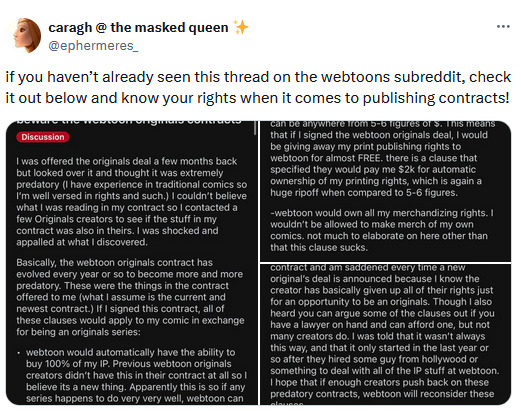


For those who are as old and falling apart as I am (/hj) and remember when Youtube was still coming into its own as a platform, what Webtoons is doing to webcomic creators is very similar to what businesses like MakerStudios did to Youtubers back in the day - signing creators into predatory contracts with the promise of fame and fortune, just to pull the rug out from under them with shit pay, shit management, and less perks than they had just doing it all on their own time and dime.
Webcomics, as a blooming industry, are now going through the same problem as Youtube did back in the late 2000's/early 2010's. No one knows how to navigate the industry. A lot of people and businesses don't even know how to profit off it, at least not sustainably (and for some platforms definitely not ethically). Very few people have come out of this industry with the money and fame they were seeking in the long-term, both because it's easy to burn out quickly but also because there is no long-term yet due to this being such a new industry... and those who have come out with those victories are often people who are still just pursuing the traditional comic publishing ways of glory, by seeking out agents, signing print deals, and doing everything that any other freelance or contracted comic creator would do, because it's safer and offers more structure than what webcomics are offering on their own. There are no regulations, no protections in place looking out for creators, it's basically just a free for all of young people looking to monetize their creations and businesses willing to take advantage of those people for a quick buck.
I don't think any of this means that webcomics have to be exclusively relegated to being a "stepping stone" for traditional print comics or grander media like film and television. They're a medium in and of themselves, a very accessible medium to boot, that welcomes anyone regardless of their status, technical skills, or background. They're wonderful for that and I think more people should be willing to give webcomics a try as a medium if they want to express themselves on their own terms.
But as I've talked about in the past time and time again, there's still going to be a separation between doing webcomics as a passion project or a hobby, and doing them as a profession. When it comes to the latter, you have to be willing to treat it professionally. You have to recognize that there will be those out there who will take advantage of you for money, because that's what the professional world is all about. This is unfortunately something a lot of creators just don't realize, because we're going through those same growing pains a lot of Youtubers have gone through (and still go through) - learning how to navigate our passion as a job, with all of the legal mess, dotted lines, and legal stipulations that come with it. And we're in the midst of that learning now, by seeing the actions of companies like Webtoons that only seek to exploit creators rather than foster them. It unfortunately will take more creators getting screwed over before anything changes. But we have to be willing to talk about it, every single time. We have to be willing to separate the creator and their own faults from the faults of the platform that's hosting them - a creator can be both lacking in their own skills as a creator as well as lacking in support which makes it impossible for them to hone those skills.
And yes, I say all of this because it concerns the criticisms I make of creators like Rachel Smythe. I think there are a lot of things she does that are indicative of her as a creator and her inability to act professionally in this industry, from LO's rampant misogyny and objectification of women to her own misfires when interacting with her fandom. But there are also just as many things that can be potentially traced back to the platform - it's hard to make better content when you're constantly being exploited and hung out to dry.
Like anon, I too hope that more creators will be willing to stand up and speak on behalf of themselves and their peers, to push back against these contracts. It's gonna suck. It's gonna be hard to want to make those moves when just about every creator is just trying to put food on the table. But for every anonymous creator who stands up and speaks, for every person who isn't willing to sign those contracts and talk about the reasons why, for every storyteller who uses their skills to spread the message, the power they have grows. We have to make it impossible for Webtoons to continue to ignore.
After all, it would be a real shame for more of these stories to come to light just as Webtoons is seeking an initial public offering in the stock market. Wouldn't that just be so unfortunate for them? :)
352 notes
·
View notes
Note
yippee! apologies if my takes are horrendously bad
my personal take on the matter is that i definitely think the dark worlds can work as a metaphor for escapism without undermining the darkners' personhood. it can be more than one thing, yknow? the darkners are important, their lives matter. and the lightners do go to the dark world as an escape from the problems they face in their own life. but that's not the darkners' whole PURPOSE, yknow? i mean. according to the laws of the universe of deltarune yes darkners' "purpose" is to serve the lightners but like it's not their whole purpose in the STORY.
it's sort of like how, in UNDERTALE, LOVE represents how distant you've become, how easy it is for you to hurt people. but it also literally gives you the power to destroy the world.
i think the biggest reason i believe escapism is at least a part of deltarune's narrative is queen.
queen's whole speech in both of her fights is about how she intends to provide escapism for the lightners (so that they will worship her but also so that they will he happy). she wants to turn the whole world into a dark world, so that everyone can live in bliss and not have to worry about the woes of the light world. she mentions "Staring, Tapping, To Receive Joy. Staring, Tapping, To Avoid Pain." which is like pretty much the definition of escapism
she wants to help Noelle with the problems she faces in the light world ("Noelle. Who Will Be There To Help Her? Her Strange And Sad Searches" and "My One Idea To Help Noelle, Failed") by just... shoving it away for a blissful fantasy world ("Wake? No, She Has Already Awakened Too Much. Let Her Close Her Eyes And Sleep Away, Into A Darker, Darker Dream.")
...i forgot the rest of what i wanted to say!
well first off, thank you for your ask! I'm going to get extremely in depth in my answer, so bear with me here. sorry it took several weeks to write this. the escapism reading of deltarune is pretty deeply entrenched in fandom, and to refute it, I felt it required a full-length essay to completely explain my viewpoint.
yes, "the lightners desire escapism" does not automatically translate to that being the darkners' actual narrative purpose. escapism can be a theme without dehumanizing those who are used in order to escape - in fact, I've read a number of stories that use someone's desire to escape to HIGHLIGHT how they're hurting others in pursuit of that. I believe that toby fox is definitely capable of telling a story about kids having a valid desire to escape, and about them grappling with having inadvertently created a world of real, living people as a result.
(I'll reiterate again that this is not the story arc that generally shows up in fanon. the common consensus is that the game will end in an omori-esque "growing out of" the dark worlds. it's why I have a huge dislike of the fanon escapism reading, given that the darkners are shown as people whose lack of agency parallels kris' own. it would feel cheap if the resolution to that plot was that the darkners were actually never meant to be agents in their own fates. but this is a digression.)
the reason why i DON'T believe that this is a story that toby fox is telling is because of the way the world, themes, and characters are written. put simply, it just doesn't come across as congruent with the story being told.
deltarune's main themes are agency, fate, identity, and control. this is a conflict that shows up in nearly every major character, is baked into the worldbuilding, and is the central struggle involving us, the player. the protagonist of deltarune is literally possessed by us against their will. the darkners are objects that have no choice but to serve and be discarded. over and over again, there is emphasis on roles that characters play - and crucially, roles that are imposed on them.
what would escapism mean, in this thematic context? in real life, escapism can represent any number of things, but in a story, a major narrative theme generally has to dovetail with other major narrative themes in the work. I would argue that escapism in deltarune would likely mean going to a place where characters are able to choose for themselves what roles they embody, or even to discard the notion of roles altogether. a fantasy of control is the only way to escape a reality where you have no agency. and honestly, it's hard to imagine that something could count as an escapist fantasy if you don't even get to choose whether or not you participate in it.
let's talk about kris.
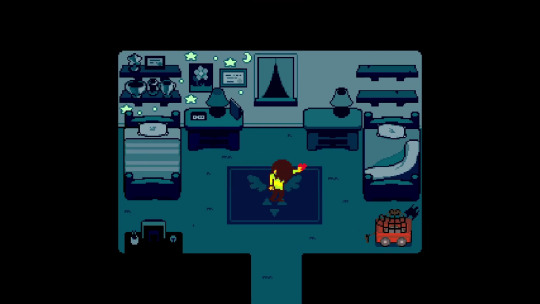
I see a lot of discussions around kris that say that kris goes into the dark worlds to escape. the dark worlds are posited as kris' fantasy of heroism. it's a world where they can seem heroic and cool, a world where they can have friends. this theory makes a decent amount of sense on the surface level, but only until you consider that kris is being controlled in order to go into the dark worlds. and it is not a control that they appear to welcome.
if those worlds represent kris' fantasy, then why don't they get to choose what happens in those fantasies? why are they being controlled by an external force, one that they actively push back against? if it's really an escape, then why does everything about this world reflect their lack of agency? if they really think this world is just a pure fantasy, then why do they care if spamton falls when his strings are cut?
because they're being deliberately obscured to the player, it is hard to say how kris actually feels about many subjects... but I do seriously doubt that they view the dark worlds as an escape. they don't act in a way that is consistent with that. they resist their lack of agency, and what little we do see of their reactions to darkner characters doesn't suggest that they view those characters as part of a disposable fantasy, either. they seem to have complicated feelings on ralsei. and of course, one of their biggest emotional reactions in the game is to the spamton fight. I would argue that that suggests they have empathy for spamton, which is a hard emotional reaction to have if you believe he's just part of a fantasy. not impossible, mind you, but it seems unlikely that kris believes that all this is simply fantasy.
also, considering that snowgrave both actively discredits the idea that the dark worlds are mere fantasy and is actively traumatic for kris... I seriously doubt they'd open another dark world in chapter 3 on a snowgrave run if their motive was purely to escape. on that route, they've seen the damage we can cause in a dark world. they know that berdly has sustained lasting damage due to our actions, assuming he's not outright dead. why would they want to try and "escape" to a place like that again now that they know what can happen?
the only answer is that they have a motive that isn't escapist.
now, as for ralsei... what part does he have to play in all this?

ralsei does play a lot to the fun, fantastical elements of the dark worlds. he delivers the prophecy that kickstarts the adventure. he flatters both kris and susie endlessly when they act appropriately heroic. he welcomes them into the castle and even makes nice rooms for them. he initially seems tailor-made to enable a fantastical experience where no real issues can ever complicate anything, and where the pain of reality can successfully be hidden from. but there's a lot of complications to the idea that he might represent an escapist fantasy.
the first, and what honestly seems the most important to me, is that he doesn't encourage kris and susie to remain in the dark worlds. he is welcoming and kind, but once the adventure is over, he prompts them to return to the light world. he wants them to deal with their more "real" problems like homework. that doesn't feel like he is trying to facilitate escapism in them. a real fantasy would encourage you to stay in it, wouldn't it?
and while ralsei is definitely invested in making sure the lightners are happy, there are always cracks that show. he isn't able to make kris ignore what happened in the spamton fight. he isn't able to convince susie to be peaceful and kind. and in his very essence, he represents a number of uncomfortable ideas. very importantly, he represents a number of uncomfortable ideas to kris.
this probably ain't your first fandom rodeo, so I'm not going to explain all the different ways that ralsei interacts with kris' personal issues. there's plenty of posts on it out there. what i will point out is, once again, it feels odd that a character who seems tailor made to bring up kris' most uncomfortable associations with their lack of agency and their outsider status in their own family would be part of a fantasy of escapism to them. you'd think that they'd prefer something that didn't have an inbuilt hierarchy, a prophecy that denied them autonomy, or especially a person that reminded them how little they fit into hometown.
that doesn't mean kris doesn't care about him at all - it seems very likely that they do. what I mean to say here is that he just seems ill-suited to an escapism reading, both behaviorally and on a conceptual level. it doesn't seem like that's at all part of his servitude towards the lightners.
of course, there is another non-lightner entity that ralsei seems diegetically engineered to serve. but I'll discuss that later.
now as for susie...
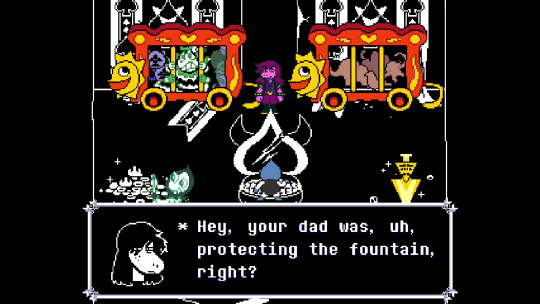
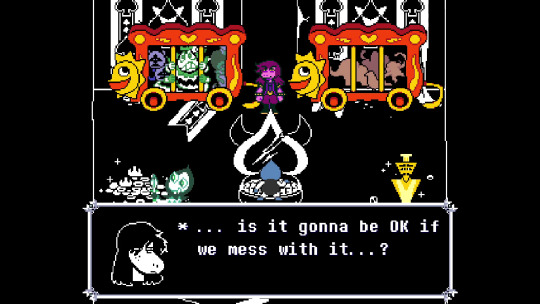
yes, susie definitely views the dark worlds as more fun than the light world. and why wouldn't she? the light world sucks for her, and she doesn't seem very aware of the fact that the dark world can also suck. you could definitely make the argument that she views the dark worlds as a fantastical escape from reality... were it not for the fact that she treats her darkner friends with just as much importance as she does kris and noelle.
can someone treat components of an escapist fantasy as real and important? of course. but given deltarune's themes of agency and control, as well as the fact that darkners exist in servitude to the lightners, I feel like you'd have to make escapism tie into forcing others into a lack of agency if you wanted the theme to feel coherent with the rest of the work. this would require susie to be limiting the agency of the darkners around her. and obviously, she doesn't do that. her presence around them might be inherently limiting, just by simple virtue of being a lightner, but she isn't aware of it, and clearly is uncomfortable with the idea of limiting anyone's agency. she encourages ralsei to make choices. and she supports lancer in basically anything he wants to do. her treatment of lancer is integral to chapter 1's narrative, and it seems like that treatment of ralsei is integral to the ongoing narrative as well!
her preference for the dark world feels very rooted in her engagement with it as its own reality. rather than trying to avoid her real-life problems by engaging in a pretense, she seems to simply want to spend time with her friends in a place that isn't cruel to her. she isn't ignoring any of the dark world's problems in service of that, either. she notices when things don't line up. if she thought of it as a fantasy, wouldn't she be inclined to ignore issues that impede the fantasy?
and critically - like kris, she does not intentionally choose her imposed role in the prophecy at first. she steps into the role of bad guy to resist it, but that role is limiting too, and she eventually acquiesces to being a hero. it's never something she's completely on board with, though. she actively pushes back the limitations that the role places on her. I find this important to reiterate when we are discussing the notion of the characters viewing the dark worlds as fantasy.
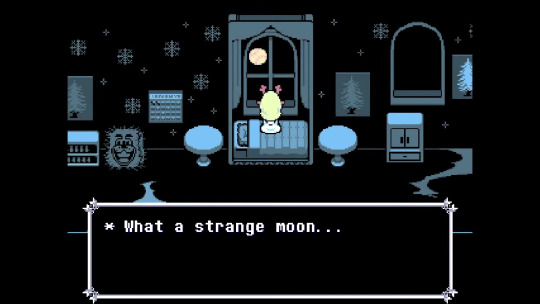
noelle has a complicated relationship to the dark worlds. susie tells her that it's a dream to make her accept the strange reality she finds herself in, which works well on her. she continues to think of it as a strange dream throughout the chapter. (though, like the others, it is not a 'dream' she entered of her own volition!)
it is also a markedly unpleasant 'dream' at times. she has her agency restricted, is kidnapped, has to evade a controlling monarch, and is even tied up in a weird evangelion cross thing on the hand of a giant robot. it's not purely fun. noelle does like scary things, and while it might be healthy for her to have an experience where she stands up to a controlling adult figure... again, the circumstances make it difficult for me to assume that this is a fantasy she would choose for herself. not impossible, mind you, but it's not the first reading of the situation that comes to mind.
and while she does say she wishes she could dream like this every day in the normal route, that does happen specifically because she was talking to the girl she likes. it makes sense she'd find that pleasant. I don't think that necessarily equates to her finding the dark worlds escapist.
and importantly, this isn't the sentiment that she expresses in every route.
again, there's a lot of analysis on snowgrave, so I won't bother regurgitating it much here. but it's nightmarish for both kris and noelle, and very likely fatal for berdly. noelle needs to believe that the event is a dream, for her own psychological safety, but one of the most important parts of snowgrave...

...is that its events, and the world it took place in, are very, very real.
noelle wants to have the strength to face her problems, both in the regular route and in the snowgrave route. rather than escaping from them, she views the "dream" as a chance to practice dealing with her day-to-day issues. it's just that in the regular route she finds that strength authentically, and in the snowgrave route, that desire is manipulated and pushed until she is forced to kill berdly. she doesn't interpret snowgrave as an escape gone wrong. she views it as a dream that became a nightmare. and those are two extremely different things.
but i haven't even gotten to the biggest thing that undermines the concept that the dark worlds are a metaphor for escapism! which is: this fucking guy is dead wrong about everything.
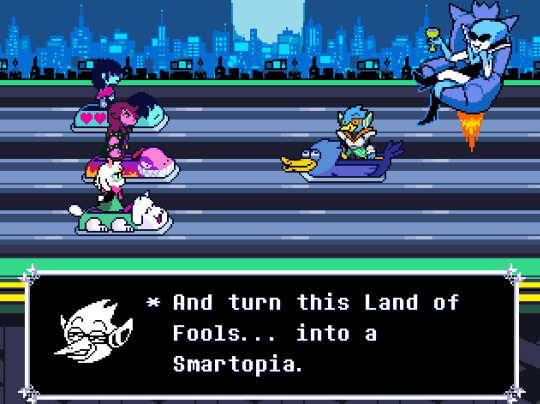
so full disclaimer - I really love berdly. I think he's slept on a lot in the fandom because he's annoying and weird. which is fair, I suppose, but I think ignoring him hinders a lot of people's understanding of deltarune's overall narrative. because berdly often illustrates a lot of concepts in the game, but his narrative framing as a joke (usually...) prevents the player from taking it completely seriously. he has things to say and ideas to show off, it's just that he's often very loud and kind of dumb in his expression of them. which is kind of the point!
ralsei brings up the idea that the darkners are meant to serve the lightners very seriously in chapter one. by extension, and by way of the literal mechanics involved in a dark world's creation, we can infer that this logic is probably something that also applies to the dark worlds themselves. they are allegedly worlds and characters that only are supposed to fulfill a dream of the lightners. but due to narrative framing and deltarune's themes, we know that that's not the full truth. however dark worlds and darkners are created, they deserve to have their own agency. they can't just exist to fulfill a higher being's wishes.
you know who else undermines that view of the dark worlds? berdly! berdly does!!!!
because berdly is the only lightner in the game so far who does take the dark worlds to be an escapist adventure! he wants to turn cyber world into smartopia. he views this as a chance to be a cool hero. he believes he's going to get the girl, he's going to shape this world to his own liking, and maybe also he's going to get queen to acknowledge him or something so he stops being a forgettable little bluebird. and not only does none of this happen, his steadfast belief that it will happen is continually a joke within the narrative!!
berdly's wishes for uncomplicated escapist fantasy are flat-out denied by the dark worlds themselves. as a lightner, those worlds should be serving him. he should have the power to do whatever he wants within the bounds of an escapist fantasy. these npcs should be singing his praises!
but he doesn't have the power. and this world doesn't sing his praise. because it just isn't an escapist fantasy. he isn't right to view it that way. his wishes for heroism are always going to be thwarted.
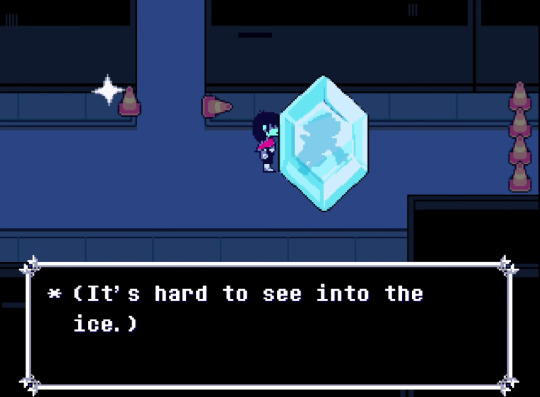
so now that I've gotten all that out of the way, let's swing back over to the subject of your original ask. queen.
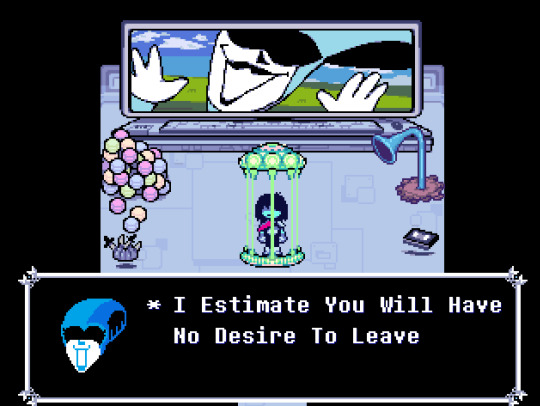
because, like berdly, queen's entire character arc is about how she's completely wrong about what the lightners actually want.
queen would in fact like nothing more to place the lightners into an escapist fantasy. she believes that that's the best way to serve them and make them happy forever. as a darkner, queen has very much internalized the idea that a lack of control is what actually makes people happy. since darkners have no choice in their destinies and are supposed to be happy in it, and since she personally finds her role as a darkner fulfilling, she believes that that's true of all people everywhere. if you want to make people happy, you just have to remove that pesky personal agency!
so she spends the story trying to force the lightners and particularly noelle into situations where she controls them in order to make them ostensibly happier. she does genuinely believe that this is the right thing to do, but as she finds out eventually, she's just wrong. noelle doesn't want that. queen believes that escapism is why the lightners use the internet... but that's totally wrong too.

while there are other searches mixed in, noelle is trying to use the internet to find her sister. instead of trying to hide from whatever happened, noelle wants to figure it out. queen's thesis about noelle and the lightners is proven wrong even before she personally encounters noelle in the dark world. it's just that queen doesn't realize it due to her limited perspective.
the concept of escapism being brought up with both queen and berdly is not there to say that the dark world is escapist. rather, it's there to say that it isn't. despite the dark worlds being a fantastical place, they are extremely real. to view them as a means of escape is foolhardy at best. you cannot act as though you are above consequences within them.
themes and ideas exist within the story for a sake of an audience. so let's get into the final character I need to discuss here. hopefully this will tie my thesis of deltarune together neatly.

that character is of course us. the player.
when creating a piece of fiction, an astute author will often identify and anticipate an audience's reactions to certain things in their work, and write things in such a way that they elicit the desired reactions. in essence, a writer is directing the "character" of the audience. how we feel and how we are anticipated to react to things is an integral part of nearly every fiction.
that effect is far more overt when dealing with metanarrative fiction that diegetically involves the audience. since the fiction is saying a lot of things about the general 'you,' the audience in aggregate, your reactions to certain things in the story have to be finely cued and anticipated by the author, so that the author can thus commentate on the reactions that you have to the story. the "character" you are assumed to inhabit is posited by the author to have certain traits.
to explain what I mean in plainer terms, I'll use the player of undertale's no mercy route as an example. because undertale is commenting on the way rpgs generally work. the player's behaviors in no mercy are attributed by characters in the story to be the result of us acting like a typical gamer. we kill the characters in the game because we want exp. and more than that, it's because we want to see everything the game has to offer. the role we inhabit in this role-playing game is that of a completionist. you could say that that's assumed to be our "character" in no mercy.
deltarune also posits that certain things are true of its audience. by being written to evoke certain cultural ideas, rpg tropes, and references to undertale, it guarantees that its audience will probably have certain traits, and spends a large amount of its conceptual focus commenting on those traits. one of those traits is nostalgia, which is probably an idea that I'll expound upon in a further essay because it's quite integral to my reading of deltarune. but the main one I mean to discuss here, and why I went off on this tangent about how audiences are dealt with in metafiction, is that we are posited as someone who believes in the logic of certain narratives.
deltarune's writing evokes a lot of portal fantasy narratives. alice in wonderland, narnia, pretty much every story where it's revealed at the end to be all a dream... the story of deltarune superficially resembles a lot of those. this, I think, is responsible for the popularity of the escapism theory. because those stories are often at their end about a child learning to put away fantasy and grow up, people tend to believe that deltarune must be about the same thing. but I truly don't think that deltarune is trying to do anything with that aspect of portal fantasy narratives, at least not directly. its main characters aren't involved in that exact type of coming-of-age arc.
instead, deltarune is very concerned with what happens to characters in fantasy, and specifically fantasy rpgs. if your world is deemed to not matter because it's a dream, what does that mean for you, who has no choice but to live in it? if you are an npc whose role has been predetermined for you via script, then can you ever decide for yourself what you want? what if you want to matter? what if you want to be your own person?
as the major controlling force of deltarune, we are initially cued to believe that deltarune is like a dream. it superficially fulfills so much of what we want from undertale fanon. hometown seems like it's a perfect idyllic town, at least until you start noticing the obvious cracks. and remember what I said about ralsei earlier? he is so reminiscent of asriel, and extremely eager to help us. it's not a stretch to say that making us specifically view deltarune as dreamlike and idyllic is probably part of his purpose in the game.
I would not say that we are posited as escapist. but the idea of escapism as brought up with queen and berdly is meant to strike at the heart of a much deeper idea that deltarune is trying to deconstruct. because if we view deltarune as a dream, escapist or otherwise, then we are inclined to write the internal realities of the characters inside off. the dark world can disappear without it mattering. we can control kris without it mattering. if it's all a dream, what does it matter? why should we care to let its characters go free? aren't we supposed to be in control?
if deltarune is an rpg... what is the significance of us interacting with it?

#deltarune#deltarune analysis#BIG big thanks to tvlandofficiall for being my sounding board and providing the flavor images for this essay#this one gets into some big overarching analysis of deltarunes construction and what it deconstructs. hope u enjoy
341 notes
·
View notes
Text
Re: Magic systems
kosmonaunt asked:
I have the weird hyper-fixation of wanting to know all their is about The Speech and just how everything works!! I love learning about how power systems work, and it helps since I’m trying to develop my own. I’m always stuck on soft or hard magic systems. Since I don’t know all there is to really know about my system.
Do you have tips on crafting magic systems? How do you feel about someone being inspired by pieces of your system?
Inspiration is fine! What you want to make sure you do with whatever inspires you, though, is to work hard to make your own take on it different from or better than what you borrowed. Around here we refer to this as "the magpie principle:" if you're going to pick up and play with/make off with a bright and shiny idea, you need to be working to produce something even brighter and shinier as your part of the "exchange". Whether or not you succeed at this (or can succeed), either sometimes or never at all, isn't the point. The point is to always be trying.
As regards building magic systems: there were three different ones in the foreground or background of my first novel alone—all of them with features that at this end of time I can recognize as being inspired by elements of magic systems in other writers' work. But by the time I'd more fully developed them, each had become something unique. The system I'm probably better known for—the system based on the wizardly Speech and its use—sprang more or less automatically from the increasingly complex answers to the question, "What if there was a manual that could tell you the truth about/the secrets of what makes the world go?". (Because once you answer one question, another pops up. "Where did that manual come from? What're you supposed to do with it? What's wizardry for?" Etc., etc.) I've spent the last few decades, on and off, answering that question in ways that (intentionally) mirror the main characters' exploration of the art of wizardry, and what it means to engage in the business of errantry in a world that mostly thinks wizards are a fairy tale.
Before getting into describing my own approach to building a system, I needed to take a little time to look around and make sure I knew what you meant when you mentioned hard and soft magic. My best guess is that you're referring to what a lot of people are calling "Sanderson's Three Laws of Magic" (fairly enough, as Brandon calls them that himself). I had a look, and have come to the conclusion that they're more general guidelines than laws... as in each of his three essays on the subject, Brandon no sooner names his basic laws/principles than he starts punching holes through them to make room for systems that don't follow them rigidly. (And frankly I find this kind of endearing.)
With his first one, in particular, I have no quarrel at all: the concept that in one kind of magic, which for his purposes he defines as the "hard" kind, rules are extremely important. (Which is why I'm kind of horrified that he apparently got dogpiled about this take on a Worldcon panel, because to me it seems so intuitive. Some of the best fantasy storytellers I know, like this one, would agree with him.) Then later he gets on to the equally valid ideas that limitations on magic are really important, and that culturally interconnecting multiple systems is useful; and here too we're in agreement. This is reassuring to me, considering that I built my first four systems—all of which feature approaches resting on similar concepts—while Sanderson was between four and six years old. :)
People using Sanderson's Laws will look at the three systems in the Middle Kingdoms books and classify them as varying sorts of relatively hard magic, with their power rooted in two or maybe three different sources. (The blue Fire is a gift of the Divine, nearly lost since ancient times and much damaged, but now slowly being recovered: sorcery is a language-based art in which no one's terribly sure where its power comes from: and the so-called "royal magics" probably started out as a blood sorcery that over centuries was shifted toward very specific uses by the power of the demigod-descendants who employed it.)
The Young Wizards novels, though, feature an extremely hard magic deeply rooted in science and (more or less under the hood) very, very rules-intensive... while its power relies on correct use of the language used to create the Universe, and the active cooperation of the Powers still busy about that work. And this is the reason why, though people are going to naturally be curious about the Speech itself, no one's going to hear very much from me about its actual words.
This is because the Speech is canonically described as so powerful that its use is something you can feel in your body and mind (and theoretically your spirit): bone-shaking, life-changing, unmistakable. And there's no way that made-up words on the page can realistically be expected to evoke physical sensations like that in the reader... or like the sense of the universe going silent around you, leaning in to listen, as you speak your spell. The careful writer knows that it's unwise to attempt to produce responses in the reader that, when they fail, will only emphasize how that thing is not happening, and stands a good chance of shattering the illusion one’s trying to weave.
So a Speech-word gets dropped here and a phrase there, but no one's ever going to get enough of it out of me to try to build a spell. Readers are better at doing that work for themselves in their own heads, out of hints and whispers. Over ten books and their interstitial material, there are plenty of those scattered through the text: not to mention the most basic principles of wizardry, which are laid out before the end of the first chapter of the first book in the series. So I'll leave you to get on with deducing what you can from canon.
Meanwhile, if I was about to build a new system, I'd look at my main characters—in the setting of their home cultures—and ask myself for answers to these questions:
What do they want more than anything?
Why can't they have it?
What kind of power will help them get it?
When they do eventually get within reach of the power / the desired thing... what will its achievement cost them?
And will they pay the price?
...Because the payment of such prices is where you find out what your heroes are worth. (Or aren't.) The above arc succinctly describes, in broad strokes, both The Door into Fire and So You Want To Be A Wizard, and a good number of the books that follow them. (Because why abandon what works, or try to fix what's not broken?) :)
With answers to the questions above you can start feeling your way toward what you need—always looking closely at the cultures your characters spring from, and how those cultures will shape their response to the magic they seek. (Or that finds them.) Maybe it's no surprise that the preferred arc structure of a writer who was a psychiatric nurse will be deeply involved with questions of motivation: because motivation is at the heart of almost all human behavior. Find the motivation and you find the character's heart—and, often enough, what kind of magic they need to make their desire and intention overflow into triumph.
...There are quite a few "How to design your magic system" pages out there. You might glance at these to see if there's anything useful in them for you:
How To Build An Amazing Magic System For Your Fantasy Novel
How To Create A Magic System In Six Simple Steps
Building Your Magic System: A Full Recipe
How To Create A Rational Magic System
However, my favorite is the "So You Want To Write A Functional Magic System" page at TV Tropes, which is nicely arranged yet also completely nonprescriptive—a pick-'n'-mix jar of prompts, things other writers have done that've worked, and generally useful ideas. (And try not to vanish too far down the many interconnected rabbitholes...) :)
Now get out there, build the world, and make the magic(s).

276 notes
·
View notes
Text
So you want to write about a Jewish Ed Teach - a quick guide to writing a Jewish man of color, by a Jewish moc
Given Taika Waititi is Jewish, I am always so happy when I see fanfic authors writing about Ed being Jewish! We need more Jewish poc rep and I'm always happy to see it. That being said, I've also seen a lot of misunderstandings, so I wanted to to write up a few quick guidelines.
Disclaimer: I'm just one Jew with an opinion, and this is based on my own experiences! I'd love if other Jews, especially other Jews of color, in the fandom would like to chime in with their thoughts as well!
It is possible to be a Jewish athiest! Judaism is membership in a people, and belief in g-d is not required (and, in my community, it's even considered a very personal question!). Some of the most observant Jews I know are athiests; belief in g-d and level of Jewish observance are not directly correlated. Cannot overstate how common it is for Jews to not believe in g-d or go back and forth on the question.
On that note, there are different levels of Jewish observance. Every individual is different, but in general there's Orthodox (very strict), and then, way on the other side, there's Reform and Conservative (Conservative does not equal politically Conservative). Conservative and Reform are very similar, except the Conservative movement tends to be more observant of traditional Jewish law and uses a lot more Hebrew. If you live in an area without a lot of Jews (like where I live!), it's very common for Reform and Conservative movements to have a lot of overlap and collaborate on a lot of stuff together.
Not every Jew keeps Kosher, or keeps Kosher to the same level of strictness.
Synagogue services are not like Christian services, especially outside of holiday services. Ordinary Saturday morning services are often more like a group conversation as we try to work new meaning out of the Torah. The B'Nei Mitzvah, the big ceremony that marks a kid being old enough to participate fully in Jewish life, is more like "baby's first thesis defense" than anything else! There have literally been pauses in services I've attended before as someone ran to the temple library to check their sources.
Not all Jews speak Hebrew. Some Jews might not know any, some might be able to stumble through the more important prayers, some might be able to sight-read okay, some might only know religious words but not modern words, some might be fluent! Just about any level of proficiency is believable.
Ed's got a lot of tattoos! Tattoos are a big traditional Jewish no-no, but (again!) different movements and different Jews have their own opinions. I know a Conservative tattoo artist! It's not something that other Jews would comment on (unless they're just assholes) and it wouldn't make anyone kick him out of synagogue services (no joke, I read that in a fic once).
Hannukah is not the only (or even the most important) Jewish holiday; it's just the one most non-Jews know about. The two biggest holidays are Rosh HaShanah and Yom Kippur. I think Ed's favorite holidays would be Purim (you get to wear costumes and put on plays!) and Passover (retelling of a story along with a big meal!).
Depending on the area and the Jewish demographic, Jews of color can sometimes feel uncomfortable in our own community, especially when other Jews automatically assume we must be converts. While this is a real issue, it is not something I want to read authors who aren't themselves Jews of color write about because it is a deeply inter-Jewish issue.
Depending on the community you grow up in, religious trauma isn't as common with queer Jews as it is with queer Christians. The Reform movement has been advocating for queer Jews since the 1960s (you read that right, yes). I'm not saying there are no queer Jews who have religious trauma, I'm just saing it's a lot less common, and I have always felt immediately accepted as queer in Jewish spaces.
The inverse is not true. Queer spaces are not always accepting of Jews (or of people of color, a double whammy!).
A few stereotypes to avoid: Jews are often stereotyped as being greedy and corrupt. Jewish kids are bullied by Christian kids because "we killed Jesus," when I was ten I had another kid ask to "see my horns." Always avoid comparing Ed directly to animals, especially rodents.
If you're a non-Jew looking to write about a Jewish Ed, I recommend doing some research. MyJewishLearning is a great website that's very accessible.
Every Jew interacts with our Judaism differently, so if you're writing a Jewish Ed, please take a moment to think about what it means for him! Membership in a community? Calming traditions that remind him of home, family, and community? A point of pride - we're a resilient lot! Even just a note in his background that he's not as connected to as he might like to be?
201 notes
·
View notes
Text
Causing fear about what happens during and post diagnosis for any condition by lying about it is not any type of disability advocacy
A lot of people online lie about both diagnostic and treatment processes and at times it is very obvious (or outright stated) that the people who are claiming these sorts of things have never been to the professional they're talking about. This is not to be any sort of "anti-self dx" post, simply that if you are this person you should consider not making PSAs about how diagnosis gets you put on govt lists or gets your rights taken away immediately.
Instead talk about patient rights, patient advocacy, and your local laws!
The most important one being that in the USA there is no govt list of disabled people that gets updated the minute you get a diagnosis. Your human rights are not just yoinked the minute you leave the Dr's office.
The ONLY people who know about your diagnosis are: the Dr who assessed you, and IF you used insurance AND the Dr submitted the diagnostic code to the insurance company, the insurance company will know. 1) you can REQUEST your Dr leave off the diagnostic code if you want to and 2) not going through health insurance may be more expensive but if you ARE very worried about your insurance knowing you can simply not use it.
Those are the only people who know! The ONLY way your diagnostic information can be shared to literally anyone else, including your primary care provider or any other Dr or the govt: 1) you sign a release of information for your medical records to be released to another person/dr, 2) you are submitting your diagnostic paperwork Somewhere to receive accommodations/assistance (for school/work, SSDI/SSI, etc--even then they will ONLY know the diagnoses you gave them), 3) you told them, 4) the court orders your medical information for an active court case (divorce etc), 5) a HIPAA violation where the dr/clinic doing the assessment illegally gives your information to anybody else without your permission. You can sue over this, as well as get their license revoked by reporting them to both the state and federal licensing boards for their profession.
As far as human rights are concerned, the main issues are in conservatorships, child custody, and medical abuse/neglect. Some things (like marriage issues and having 'too much money') are strictly SSI related which many disabled people are not on. Conservatorships and child custody issues are NOT based on your diagnosis! You can literally have this issue with conditions that many people on here overlook such as depression or GAD. These are based on severity of symptoms and someone trying to claim you are very ill. Meaning you can provide evidence that you do not need conservatorship, need a DIFFERENT conservator, or are able to care for your child either with or without assistance. Medical neglect/abuse is a big human rights issue but again this is NOT based on diagnosis, this can happen to anybody. You can also sue and report these incidents to revoke a professional's license.
While yes certain highly stigmatized conditions (both physical and mental) are more prone to experiencing these issues, telling people that if they seek help at all they will lose their rights and bad things will happen to them is unforgivable levels of fear mongering. There is not a diagnosis that will automatically revoke your human rights. Especially when it comes to mental health where many therapists will treat you while never putting a diagnosis down on paper because MANY therapists are aware of those issues and will not list a diagnostic code by default unless you request it for reasons like disability hearings.
#cripplepunk#cripple punk#disability#actuallydissociative#dissociative identity disorder#antipsychiatry#mad pride#<- putting those two tags because Jesus Christ I've seen a lot of fearmongering from the new baby wave of these movements#Red.log#.log
462 notes
·
View notes
Text
look. not to be too mean on main. the rightful heir thing. if you don't care about the intricacies of property law or legal writs and just want to focus on characterization and other aspects of storytelling, fine.
but it truly does look very goofy when you start "debating" this while lacking historical context and methodological tools. sometimes a constitutional crisis (that was already resolved in the 12th century and whose results you can always look up) can't just be settled by appealing to one's anachronistic opinion and accusing those who disagree of misogyny.
there's a difference between suggesting how things should be (i.e. prescriptive, i.e. women should never inherit the throne) and analysing how things were for a myriad of socio-political reasons.
also, trust me, the Dance being fictional is not the gotcha people think it is. it's plenty obvious. i'm sorry to say but the premise is so flimsy it would never have happened like that irl.
final idea: likewise, perhaps being condescending about people who do take the time to criticise the premise is veering a little bit towards anti-intellectualism. 'idc about succession laws ergo i'm more enlightened bc i've unlocked an edgelord-y way to enjoy fiction'. a medievalesque fantasy setting is going to attract commentators who are interested in medieval history or at least aspects of it. they may find copy-paste scenarios from real history and think it interesting to compare and contrast. it's not immediately equivalent to treating aegon and rhaenyra like your ballot choices next election, and, equally, they're not discussions without merit.
comparative analysis is a transferable skill! if someone doesn't want to partake, fine, but i think this attitude of turning one's nose at it is a tad coarse. there are many fans who take the time to write informative posts and contextualise this fictionalised universe and it's a shame to automatically write-off what is ultimately a rich tradition in internet asoiaf spaces
#*people with history degrees facepalming their way through the fandom*#everyone has a pet peeve and this is mine#my other controversial opinion is that it's also silly to say it doesn't matter from a storytelling perspective as well#if your intrigue is shaky then it brings the quality of the overall story down#one principle of writing is that your world needs to have consistent internal rules no?#if these rules flip-flop from one situation to the next then that would be a flaw in the worldbuilding#and one thing about grrm's dance is that the intrigue is one of the weak points#succession for the iron throne
120 notes
·
View notes
Note
How would Belo be with a cult leader s/o?
She already has followers consisting of both monsters and humans who rave about how perfect she is, and they think Belo is a testament to that.
I mean, not just anyone can receive the affection of an angel; she must be akin to a god!
There is a hierarchy in the cult, and Belo is at the top of it. He can rest his head on her lap and watch as the others worship the very ground his lady walks on (he doesn't have a choice; the leader demands it this physical contact, otherwise she will be unhappy the whole day).
They validate Belo in every thought he has of his lady and also obey him as he is basically the leader's right hand (or so he believes, but in reality, they respect him so much because he is their leader's precious).
And what if more angels started coming out of the woodwork to serve his lady? If he was able to handle the cultists, surely this would be a stretch.
I can just imagine the cultists praising Belo as they dress him up in lingerie fitting to their leader's taste, then tie him up, mindful of his wings, and leave him in his lady's quarters. His lady comes in and gets on top of him, caressing his wings and whispering something about being her 'pretty little canary' and 'give yourself to me, show me your devotion.'.
This is the ideal situation for Belo.
Unlike most angels, who tend to have a mindset favorable to sharing with other celestials, Belo gets intoxicated when he realizes he's the only holy entity in a location, that he no longer has to share, that his tier hardly matters because he's the only celestial present and automatically the authority in a plethora of matters. He feels special in a way he never has before and his ego swells almost incomprehensibly.
Which is exactly why he's living his best life in this situation. Not only are you a sacred being, your generosity blinds you to the misdeeds of your own following. My Lady they are clumsy, obliviously disrespectful, they hold no discipline! Someone who is built to serve and protect needs to teach them how to behave, how to conduct themselves before you and how to make sure that your love is not for naught.
It's only right that Belo be the only one allowed to touch you. His holy nature makes him incapable of corrupting you, and others live through him their own lecherous, selfish fantasies of being your favored.
With him at the helm of many secondary areas and tasks, your cult blossoms like the loveliest lotus and gains a level of steadfast efficiency previously unforeseen.
The arrival of other angels... Complicates things. They're immediately perceived as threats to Belo's position.
You may not know this, but he's only a power. If there's a dominion, throne or, Eden forbid, a seraphim... By their own laws, Belo could have to step down and allow the worshiper-tiers to overrule him in the hierarchy.
And he goes half-mad at the idea.
That's not happening.
No tier can understand and service you better than him, and Belo will personally confront the more powerful celestials about this. There is a very special balance here, in your wonderful garden of light, where the rank of an angel is not what makes them worthy of your love and guidance. Belo may be just a power outside of these blessed grounds, but in them, he is your second in command, your favored, your fighter, your whorshiper, your guardian. He's your everything.
And though he may celebrate the arrival of more angels beside you, he makes sure they always remember their place.
He's determined to keep this perfect balance.
In your name, he thinks as he placidly remains in position, bottom eye counting the patterns on his service gown and the jewelry on his spread wings, everything in your name.
This won't be like before. He's doing so much better now, the cultists are behaving perfectly, the workflow is stable and satisfactory, the other angels are impeccable. You wouldn't leave them. Not when everything is immaculate, when mistakes are non-existent. This time will he different.
You enter the room, and his thoughts vanish.
76 notes
·
View notes
Text
Who are the worst siblings?
This is a tournament to find who the worst, most terrible siblings are.
"Siblings" includes half-siblings, step-siblings and adoptive siblings, but not in-laws. If you want to submit non-biological things which are kind of siblings, make a case for them! For example if someone submitted Data and Lore, I'd probably allow it. The Seven Sisters oil companies? Go for it!
"Worst" can mean a lot of things. Are they awful to each other? Are they a menace to society? Are their vibes just rancid? Submit them!
100 year rule on real life human beings: if they died before 1924, and I don't feel like it's in bad taste, it's fine. So go ahead and send in Cleopatra VII and Ptolemy XIII. This rule is just for people, so Wolves 40 and 42 from Yellowstone National Park would be OK for example.
Just because I've mentioned them as examples or put them in the header or icon doesn't mean they're automatically getting in. Submit them!
Submit siblings here
@tournament-announcer
56 notes
·
View notes
Note
I. Don’t understand how being against homophobia and misogyny and informational suppression is cultural relativism? Yeah I have a #USAmerican raised Christian bias but I think not being bioessentialist and anti-intellectual is. Normal???? Genuinely don’t understand
Okay so. My guess from how this was written is that you are either a child or just into your 20s. I'd expect much different wording and approach if you were older. So. I'm going to try and be as gentle and clear cut as possible.
1) Orthodox Judaism is actually quite diverse and also different from Christianity, even fundamentalist Christianity .
2) What you're witnessing is not necessarily indicative of the actual community values; you are interpreting without insider perspective, or seemingly any actual knowledge. You're also ascribing motive to actions that may or may not be there.
3) many orthodox Jews, myself included, are queer and trans and embraced by our community. Every person of authority I've spoken to on the matter says that my incredibly queer, t4t marriage that gets read as gay no matter what, still gets the mitzvah of sex on erev Shabbos, and that includes my main community of Chabad.
4) many books are screened before being given to children by all people everywhere for a variety of reasons. Just because you don't fully understand the reasons as you are not yourself Orthodox Jewish doesn't mean that they are automatically something to be hated due to your preconceived notions.
5) Assuming a group is inherently homophobic, misogynistic, etc. Simply because you don't understand them as you are not part of their community is in fact a bad behaviour, yes. Don't do that. Most of the time, in most communities people are at worst confused.
6) As for misogyny... It's important to know the ways in which Judaism actually structures it's sex roles. No one has different sex roles because they're lesser, which misogyny implies. And every SINGLE person I have ever met observes mitzvos based on sex due to actually desire, not coercion. But for example, married women cover their hair as a way of making their marriage even more holy. Men meanwhile are told to cover their head at all times so they are mindful of G-d at all times. What does this imply at first glance? Why, that women are capable of remembering G-d at all times and the men are silly and must forget G-d if not reminded! Do we think this is all to the interpretation?
So. Before you judge our community so harshly... Perhaps also consider the last century of human history alone. We are being killed and hurt at alarming rates again, especially in the USA. Is it any wonder we don't stop in the streets to justify our existence to you?
Lastly, an oversharing of my personal details because as I am currently safe and well at home, I feel I ought to give you opportunity to understand that you aren't seeing/understanding the complexity of sex roles in Judaism
7) so, yes, orthodox Judaism has gender/sex based roles. It also is, in my experience, pretty flexible to meet individuals. I was coercively assigned female at birth. I was however by Jewish law, tumtum. In English terms, I had ambiguous genitals which could be surgically changed. My sister wanted a baby sister. And so, I was surgically "corrected" and raised female, until puberty and onset of hormonal problems that indicated that it wasn't just a genital mutation. I felt disconnected from binary gender, and at time, in part of my community having a label for me while the hospital I was born at had simply labeled me "incorrect", I came to embrace a masculine social standing. Because I was unable to be sexed as an infant, have masculine levels of testosterone and a lack of menses for years at a time, I have to adhere to both male and female sex based mitzvos. Religiously, I am operating with the strictest possible adherence, but this is all written and debated, as are all of the other sexes in Judaism. I am, however, allowed to exist as intersex in a Jewish community in a way that I am NEVER allowed to exist as intersex without a fight in the secular world, to the point that if it's not relevant I identify only as trans, because otherwise it becomes too complicated in the secular world. And this is genuinely because there is actually a space for me to exist in, as there are six Talmudic sexes.
Being trans and intersex is "allowed". Being queer is "allowed". Some communities differ, but I've lived in seven, and all of them have been more accepting of me being queer, trans, and intersex, than any secular space, including liberal and leftist spaces. At WORST, I am met with curiosity because I am new to the community. I think, perhaps, too many people in this world mistake curiosity with hatred.
#antisemitism#can i summon jumblr for some support with the tag pls#jumblr#long post#based on tone I'm also assuming youre one of my followers not the harrassing anon#hence the answer
158 notes
·
View notes
Note
waitt i need to know why you hc ludo bagman as a genuine death eater sympathiser omg. that sounds fascinating
thank you very much for the ask, pal!
that bagman was really a death eater sympathiser is something i've been committed to believing since i first read goblet of fire, but it's something i've been pondering particularly recently as part of writing subluxation, which is a big look at the set-up and function of the wizarding state during voldemort's takeover in 1997-1998 from the perspective of percy weasley.
which means - of course - that it requires a bit of grappling with percy's main man - and bagman's frenemy - barty crouch sr.
the way the canon narrative - not only harry's perspective but also characters harry implicitly trusts, like sirius and dumbledore - wants us to react to crouch sr. is something that really interests me. because i think it's reasonable to say that - while the series doesn't regard him as a villain villain, per se [as it does for characters such as umbridge] - it doesn't see him as someone we are supposed to regard in a particularly positive light either, even after the reveal that barty crouch jr. was a death eater and his father was justified in sending him to azkaban [even if he didn't keep him there...]
crouch - like cornelius fudge, rufus scrimgeour, and percy himself - is a victim of the narrative's general consensus that ministry workers who are not under the impression that the ministry cannot function admirably or efficiently without input from dumbledore are people we should have no real respect for. he is shown, in his canon appearances, to be something of a jobsworth - officious and dull and uncreative in his thinking, which serves both as a personification of what the series thinks about the civil service and as a narrative device to make the reveal that he broke his son out of prison and kept him, essentially, drugged at home all the more shocking.
but crouch is also interesting in another sense - in that he is not a villain, but that he does not fit into the way the series categorises the behaviour of its heroes surrounding mercy.
we are told in goblet of fire that crouch - as head of the department of magical law enforcement in the 1970s - was responsible for the escalating harshness of the government's response to voldemort. policies such as the instructions for aurors to shoot to kill if they encountered suspected death eaters and the use of internment without trial of those accused of collusion with voldemort [both of which, as i am always banging on about, are references to the actual behaviour of the british state in northern ireland during the same time period] emanate directly from him.
and this ties into a theme which is prominent in the run of books between prisoner of azkaban and half-blood prince: that the world is not split into good people and death eaters. the purpose of these central books in the series is to show that - once harry's worldview widens from the hogwarts-exclusive focus it has in the first two, more childlike, books - the rot in the wizarding world goes far beyond voldemort. the wizarding state is shown - time and time again - to be cruel, corrupt, prejudiced, and stagnant, and the ministry's most loyal bureaucrats and their unwillingness towards mercy are largely blamed for this situation.
because of course - as i have complained about before - the morality of the harry potter series is individualist. good and evil are located by the text within the individual, which means that states and their institutions are automatically less interesting to it than singular heroes and villains in an epic baddies-versus-goodies showdown.
but it's also true that - as a protagonist - harry's morality is extremely self-serving. by which i mean that he has a tendency to reach black-and-white judgements on people he encounters - they're good if they're nice to him, they're bad if they're cruel to him - and to never deviate from them.
and - indeed - to never have to deviate from them. it's worth saying that harry's conversion rate on being right about people is really high - his immediate dislike of characters such as draco malfoy, lockhart, and umbridge is entirely justified; his immediate trust of characters such as sirius is the same. his only misjudgments relate to characters who are crucial to the narrative outside of harry's feelings towards them - he's wrong to trust the teenage tom riddle in chamber of secrets, he's wrong to trust the fake "moody" in goblet of fire, he's wrong to trust "bathilda bagshot" in deathly hallows, and he is, of course, wrong about both snape and dumbledore.
but - outside of this - his judgements are usually proven to be right [and, indeed, his good instincts are lampshaded by the narrative in deathly hallows, when lupin literally says this]. and so we are supposed to assume, i think, that character judgements he makes which we see no broader resolution to are correct.
for example - harry's conviction that stan shunpike is under the imperius curse is never taken by the text as anything other than true. there is no suggestion whatsoever that harry is wrong and that stan - a young, working-class man with delusions of grandeur, who would presumably be reasonably easy to radicalise - might be a genuine supporter of voldemort, and harry's complete certainty that stan is falsely imprisoned [with the callbacks this gives to his feelings about sirius' treatment] isn't used by the narrative as an example of him being naive and self-righteous, but as an example of the fundamental goodness, sensibleness and mercifulness of his character which justifies his ascent to an allegory for christ in the latter stages of deathly hallows.
and the same applies to ludo bagman. when harry witnesses his trial, he finds the suggestion that he might have been a death eater absurd, clearly finds the jury's immediate dismissal of it amusing, and is unsympathetic to crouch when he is infuriated by bagman's acquittal. he takes dumbledore's assurance that bagman has never been accused of any nefarious activity since without question [something he does not do for snape] and his view throughout goblet of fire - much as it is for stan - is that bagman is seedy and not particularly clever, but that he is also such a transparently ridiculous person that to suspect him of being someone voldemort would care about is idiotic, and that crouch's inability to bang him up in azkaban on spurious charges can only - given what happened to sirius - be a good thing.
but the issue is that - notwithstanding his commitment to extrajudicial punishment - barty crouch sr. is... clearly right to investigate bagman thoroughly.
we are told in order of the phoenix that voldemort's power depends on a vast network of ministry informants. we are shown in deathly hallows that his coup is only successful because almost the entirety of the civil service remains in post. we are shown time and time again throughout canon that voldemort's views - on blood-supremacy and magic-supremacy, on the supposed value of maintaining the class system - are incredibly mainstream political opinions, and we can infer from this that a majority of the population of wizarding britain have the view sirius tells us his parents did: that, while they're uneasy with voldemort's violence and while they're certainly not paid-up death eaters, they think voldemort has the right idea.
dumbledore - and the order - are shown throughout canon to be preoccupied with the big fish. the death eaters they target are voldemort's inner circle - the marked loyalists he trusts as generals. we never see - outside of the snatchers - the lower-profile but infinitely more important cogs in voldemort's machine: the people who traffic stolen goods and lift ministry secrets from filing cabinets and observe potential recruits in pubs and pass gossip along whisper networks until it reaches the dark lord. the sort of people crouch clearly wanted to eradicate, but couldn't find the goodwill within the ministry to do so.
bagman can easily fit this profile - he's presumably a pureblood or a half-blood and raised in the wizarding world, since his parents canonically have at least one wizarding friend [augustus rookwood]; he is clearly relaxed about making use of the class system, since he expects to finesse a job out of rookwood when his professional quidditch career ends; and he is possessed of extremely dubious morals. we also know that pleading ignorance of who you were working for was a famously successful - and, presumably, voldemort-sanctioned - way of getting away with having colluded with the death eaters. it makes just as much sense - then - for bagman's "oh, i just thought i was chatting about state secrets with rookwood as a mate" act to be in the same vein as lucius malfoy pretending to be under the imperius curse as it does for him to actually have been that dumb, and so it makes sense for him to have gone actively looking for information he could pass to rookwood because of some sympathies [even if they were uneasy ones] with rookwood's cause.
do i think he was a marked death eater? no - i think voldemort couldn't pick him out of a line-up and he never achieved anything other than being an informant rookwood could tap for details and documents he could pass up to his master if they looked interesting.
but this would have been what voldemort's ministry infiltration actually looked like - and it is a much more insidious, and interesting, concept than loads of aristocrats fighting and being sexy, which i think is really worth exploring when we think about wizarding politics.
#asks answered#asenora meta#i am obsessed with wizarding bureaucracy and i make no apologies#ludo bagman#barty crouch sr
46 notes
·
View notes
Note
Hold on did I get this right from twitter. Are the far-right Spaniards now complaining about police brutality because they wanted to storm the Audiencia Nacional to opose the Catalan amnesty??
Kaixo anon!
They didn't go to the Audiencia Nacional, but to the PSOE headquarters in Madrid.
For context: although the elections were held in July, there still isn't a President of the Spanish Government. PP leader Feijóo failed to gather votes enough to become President in the Congress, so now PSOE leader Pedro Sánchez is trying. He has already some support, but will only be able to become President just if JPC (a Catalan party that was key in the failed referendum for independence of 2017) votes for him.
So JPC and PSOE are negotiating, and it seems like PSOE has accepted JPC demands: that Catalan politicians that were imprisoned and/or accused of the crime of treason are amnestied; and that the 15 billion euros debt Catalunya has with Spain is canceled.
So around 4,000 Fascists rallied to the headquarters to show their discomfort with these concessions to independentists - in their words, of course!! -, accusing Sánchez of traitor and basically asking for his head. The police has officially stated they identified 200 protesters with "an ultra aesthetic" which in their language means full on proud nazis with visible nazi symbols.
They showed flags straight out the 15th century, like this one of the Habsburg coat of arms:

Or even further back to the 13th century with the silhouette of Cid:

Some of them wore helmets imitating the conquistadors' [eskerrik asko @kinkyviolence !!]

They mocked the Catalans and the police brutality they recieved during the referendum process:

(Police officers from other regions of Spain arrived in Barcelona in cruise boats decorated with Tweety, hence the flag)
And most importantly: they started throwing down the barricades protecting the rally intinerary, throwing glass bottles to the police officers, and tried to storm in the headquarters of the party that has the most chances to be in power in Spain with ropes, sticks, and iron bars, so the police reacted as expected: whomps, rubber balls shots, and tear gas.
Of course since fascists have always had the police on their side, they started freaking out on social media describing it like total war, dictatorial repression, police brutality, unnecessary violence, etc. So, you know, when Basque or Catalan people recieve the same treatement or worse when rallying unarmed it's okay and expectable, but when it happens when they literally want to storm in a building with iron bars and ropes is dictatorial censorship.
Also on a sidenote, leftie people on social media are mocking them under the tag #CayeBorroka. It's a play on words with kale borroka (street fight in Basque) that was infamously popular in the 90s-00s in Hegoalde with subgroups linked or not to ETA that would vandalise or burn down buses, benches, automatic teller machines, etc as a protest against Spain's policies regarding EH or ETA; and the diminutive of official posh name Cayetano, that has become a noun itself to describe someone wealthy and far righter.
And I have mixed feelings regarding this tag. Because kale borroka was considered "low intensity terrorism", and people accused of it was judged under the anti-terrorism law, which could easily mean years in prison for burning down a dumpster; meanwhile these fascists not only won't get arrested, but they're already publicly urging people to go back and do the same tomorrow.
But as usual, there's one treatment for Basques and another one for anyone else, so it's not really something new, just that I don't like the CayeBorroka gag ngl.
#euskal herria#basque country#pays basque#pais vasco#euskadi#catalunya#spain#news#fascists#whatever#long post#sorry#anons#politics
61 notes
·
View notes
Note
I have a question about passports. Are Palestinians in the WB, Gaza and occupied Jerusalem stateless? I know that Gaza has been under blockade, but how can Palestinians outside of Gaza travel? Do they have a special passport?
God be with Gaza and Palestine. The people are with you.
Hi anon, this is a great question! This is going to be long because it's actually one of the core reason why Israel is an Apartheid state, and contributes to the erasure of Palestinians.
First part of your question: yes, Palestinians are stateless. By definition, that means they often face trouble (click) accessing core state-based rights, like having legal jobs, owning property, being able to do build on property you own, and existing as a person with rights.
Now, since 1948, Palestinians have traveled around the world, there is an international diaspora (click on the "maps" section—although the map is not totally up to date and doesn't have totally complete data). For example, I grew up with many United States born Palestinians, meaning that they automatically are granted citizenship. However, according to international law, as my grandparents are refugees, their refugee status is passed down through generations—meaning that I am also a refugee.
I bring this up to analyze the complicated political status of the Palestinians, and why Palestinians, while citizens of different countries, don't have a clear political identity within the world. And when we get to Palestine itself, the Palestinians there face systematic statelessness enforced on them by the Zionist entity.
Palestinians in Palestine, have a passport... but even then, they aren't allowed to move freely. It does not have the same meaning as most countries' passports, because, as I said, Palestinians have no official state. There are different types of ways that Palestinians can travel depending on where they are from—for example, Palestinians in the West Bank are *not* allowed to use Ben Gurion Airport, and must go through the border to Jordan to use Aaliya to go wherever they want. But they do still have to report that they're leaving into Jordan and say where they're going. Occupied Jerusalem residents can use Ben Gurion but it's not very easy for them and they often face harassment. Gazans basically cannot travel, though, except if authorized access to study abroad and given written permission by the host country, which requires stringent verification and can be taken away at a moment's notice.
This is one of the core attributes of Apartheid—restriction of movement based on ethnic or racial or religious identity. This restriction allows for heavy monitoring of Palestinians, under the guise of "security threats."
Second Part of your question:
I actually had to consult a couple of different people I know who regularly travel to the West Bank, because each part of the territories have different rules. I've never been there so I get regularly confused with which places have which rules. I'm still not sure about the colors of the cards I mention so if someone has been there recently and would like to clarify, feel free to add to the post which cards belong to which.
As a whole, the people in the West Bank and Gaza are not citizens. Some people in Jerusalem do have citizenship, specified with a colored "card." Palestinians call their cards "Haweeyah," or identifications. Citizens also have a different colored license plate which tells the Zionist Entity that the people in the car are citizens. But the very existence of these cards, do not guarantee them rights as a citizen if they are Palestinians, especially if they are not Jewish. Palestinians are often detained without warning (called administrative detainees-click), denied to build on their own property, or even expelled and physically kicked out from their homes without notice, which is what happened in 2021 in Sheikh Jarrah, has happened before, and continues to have happened since.
In theory, these identification cards allow them to travel throughout Occupied Palestine, but they must go through militarized checkpoints where Palestinians are humiliated, tortured, and even murdered by the Zionist Entity. Every Palestinian has to go through these checkpoints, no matter what type of card you have. They are hundreds of them throughout Palestine (someone told me there are 630?), and often, people don't know whether or not they'll actually get through that checkpoint until they've gotten through it. There is no guarantee for Palestinians, no matter if you're a citizen or not, whether you'll even make it out of there alive depending on who's manning the checkpoint. I recommend reading this resource from people in Jerusalem about the checkpoint system and the division of Jerusalem (Al-Quds in arabic) for a much more in depth analysis of the checkpoint system (click).
Now there are other types of cards as well. The card if you're from the West Bank, which we call Ad-Dhuffa, are not citizenship cards but they can allow you to move throughout the territories, albeit still through the checkpoints. The car plates are also a different color noncitizens. They specify that they are residents of the West Bank. These people cannot go into the Zionist Entity freely.
I do want to emphasize though—"citizenship" for those from Jerusalem can be taken away at a moment's notice, especially if the Zionist Entity finds out that people have citizenship elsewhere in an effort to force Palestinians out as much as possible. Most Jews (except for Ethiopians ones, wonder why) are encouraged to immigrate and are automatically given citizenship no matter what other passports they may hold, even paying millions of dollars for them to come to Palestine and settle.
Now it's clear that this is apartheid—the control of movement is one part, and separating even citizens as a second class status that may be taken away is how the Zionist entity encourages ethnic cleansing at a slower scale than the Nakba in '48, but still devastating nonetheless. But that heavy surveillance of movement can even be at a much, much, smaller scale.
I want to focus in on one city in particular in the West Bank—AlKhalil (some may call it Hebron or the Old City). This is the city where my dad's family is from, so I've heard stories about it since I was little.
AlKhalil is a segregated city to the max. Palestinians are not freely allowed to walk through the streets, with some designated as "Jews Only" streets. This means that even if their front door faces the "Jews Only" street, Palestinians can't go through it at risk of being shot by a settler or soldier, so they go climb over leave from the backdoor or even climb over rooftops to leave their houses. Settler Jews, however, are allowed to go anywhere they want, all while carrying heavy artillery and terrorizing Khalili residents.
This also illustrates another part of apartheid USAmerican might be most familiar with—calling imagery Jim Crow Era and sundown towns that still go on today. Fully segregated, prohibited from even walking down streets, Palestinians are denied even core human rights, KNOWING that they're second class residents (not citizens!) that are not even afforded the simple luxury of deciding how they can walk to work or school. In fact, shopkeepers on the ground level install metal nets separating the first and second floors, because the settlers on the second floor often throw trash onto the street or into their windows. There is a literal fence between Israelis and Palestinians with the Palestinians on the bottom.
The material reality of apartheid is segregation and it is justified by the notion of "security measures," but is in fact a concentrated effort to make the lives of Palestinians difficult enough to want to leave as soon as possible. One of the forms of colonialism is the effort to crush hope and make their lives absolutely as unlivable as possible, and if they can get Palestinians to just *leave,* then they can say: "Look! We didn't take it from them! They decided to leave on their own. So we can move in now, and they have no right to come back because, well, they left!" Because of that, apartheid is one of the tools of colonialism to rob the indigenous communities of their land, and is why I wanted to use this question to discuss this.
Thank you for this question, sorry it took so long! Here are some resources I found on Palestinians' experiences:
The weaponization of Jewish identity against Palestinians to expel them from their homes by Mohammed ElKurd (highly recommend): https://mondoweiss.net/2023/09/jewish-settlers-stole-my-house-its-not-my-fault-theyre-jewish/
Checkpoints, Part 1: Severing Jerusalem by JerusalemStory.com: https://www.jerusalemstory.com/en/article/checkpoints-part-1-severing-jerusalem
Mapping Hebron Apartheid: https://www.hebronapartheid.org/
104 notes
·
View notes